




































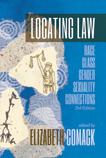

















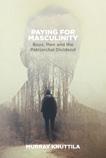





Paperback • 9781773637631
$34.00 • Forthcoming October 2025 Digital Format • $33.99






























































Paperback • 9781773637631
$34.00 • Forthcoming October 2025 Digital Format • $33.99
by Robyn Maynard
Robyn Maynard’s meticulously researched and compelling analysis of state violence challenges prevailing narratives of Canadian multiculturalism and inclusion by examining how structures of racism and ideologies of gender are complexly anchored in global histories of colonization and slavery.
—Angela Y. Davis, author of Abolition Democracy: Beyond Empire, Prisons and Torture
In compelling and accessible prose squarely situated in the global socioeconomic context, Maynard provides a sweeping overview of Canadian state violence from colonial times to the present, seamlessly articulating the relationship — and distinctions — between settler colonialism and anti-Blackness.
—Andrea J. Ritchie, author of Invisible No More: Police Violence Against Black Women and Women of Color
A comprehensive account of policing Black life in Canada and a vision for Black futures beyond surveillance and confinement.
social Science / Cultural & Ethnic Studies
social Science / African American & Black Studies
social Science / Race & Ethnic Relations
key content highlights
On State Violence and Black Lives • Devaluing Black Life Existence, Demonizing Black Bodies: Anti-Blackness from Slavery to Segregation • The Black Side of the Mosaic: Slavery, Racial Capitalism and the Making of Contemporary Black Poverty • Arrested (In)justice: From the Streets to the Prison • Law Enforcement Violence Against Black Women: Naming Their Names, Telling Their Stories • Misogynoir in Canada: Punitive State Practices and the Devaluation of Black Women and Gender-Oppressed People • “Of Whom We Have Too Many”: Black Life and Border Regulation • Destroying Black Families: Slavery’s Afterlife in the Child Welfare System • The (Mis)Education of Black Youth: Anti-Blackness in the School System • Against the Romance of Police Reform: Expanding Police Power while Undermining Black Liberation • Futures Beyond Policing: Making Police Obsolete Imagining Black Futures
The bestselling first edition of Policing Black Lives became a mainstay of bookshelves and classrooms across North America and Europe as the first comprehensive account of the state-sanctioned surveillance, criminalization and punishment of Black lives in Canada. This revised and expanded edition updates the original text in the wake of global Black uprisings in 2020 and offers new insights on how to build liveable futures without policing. Maynard sheds light on the state’s role in perpetuating contemporary Black poverty and unemployment, racial profiling, police killings, incarceration, immigration detention, deportation, exploitative migrant labour practices, disproportionate child removal and the school-to-prison pipeline, as well as the ubiquity of Black resistance. New chapters document how half a century of police reforms have undermined Black freedom struggles while expanding policing and offer a compelling vision for building new forms of safety.
Robyn Maynard's writing on borders, policing, abolition and Black feminism is taught widely in universities across Canada, the US and Europe. The first edition of Policing Black Lives was an award-winning, highly acclaimed national bestseller. The French edition, NoirEs sous surveillance: Esclavage, répression et violence d’État au Canada, won the 2019 Prix de libraires. Her second book, Rehearsals for Living, co-authored with Leanne Betasamosake Simpson, is also a national bestseller and was shortlisted for a Governor General’s award, among other accolades. Maynard is an assistant professor at the University of TorontoScarborough.
George Floyd; Canada Border Services Agency (CBSA); Regis Korchinski-Paquet; Bony Jean-Pierre; Caribbean Seasonal Agricultural Workers; Black fugitives; carding; Black Loyalists; Seasonal Agricultural Worker Program


by Emma Battell Lowman & Adam J. Barker
An excellent exploration of Canadian Settler constructs and ways to decolonize ... aimed at redefining relationships to lands and peoples.
—Karl Hele, professor, Mount Allison University
While my own thinking and practice as an educator was greatly transformed by the first edition — this one takes it to a new level. The authors expose how settler colonialism permeates the political landscape today and demonstrate in depth that settler colonialism is far from over, morphing as Indigenous Peoples confront it. This updated version will continue to serve as a central resource in my teaching and leadership work.
—Shauneen Pete, chair, Emerging Indigenous Scholars and professor, Royal Roads University
Canada is a settler colonial state. What does it mean to be Settler, and why does it matter?
The national conversation about settler colonialism has advanced significantly since the first edition of this defining book, thanks to Indigenous struggles that have resulted in high-profile official apologies and inquiries into the devastating inequity between Indigenous and Settler lives in Canada. However, this progress is not enough — many of the same problems persist due to the underlying inequalities at the core of Canadian identity, politics and society.
Political Science / Colonialism & Post-Colonialism Social Science / Sociology / General
Preface to the Second Edition • Why Say Settler? • Canada and Settler Colonialism • It’s Always All about the Land • “Settling” Our Differences • Fear, Complicity, and Productive Discomfort • Decolonization and Dangerous Freedom
In this revised second edition, Battell Lowman and Barker reflect on the term’s changing, more nuanced and continued importance. Touching on the rise of right-wing nationalism, the power and limitations of social media and ten years of federal Liberal government, this new edition of Settler considers the successes and failures of Settler Canadians in supporting decolonization and charting our next steps towards transformative change.
Emma Battell Lowman is a Settler Canadian originally from the overlapping territories of the Haudenosaunee and Anishinaabe Peoples, near Niagara Falls, Ontario. Her work focuses on Indigenous-Settler histories in British Columbia, settler colonialism, Indigenous resurgence and decolonization in North America, and the history of crime and punishment in Britain.
Adam Barker is a Settler Canadian, born and raised in the territories of the Haudenosaunee and Anishinaabe Peoples in what is presently Hamilton, Ontario. He is a researcher, educator and activist on settler colonialism, racism and decolonization.
MMIW; Doctrine of Discovery; TRC; 1492 Land Back Lane; Unist’ot’en ; Wet’suwet’en; Idle No More; Indian Residential School; Freedom Convoy; Oka Crisis; White Paper UNDRIP; RCMP


Paperback • 9781773637433
$32.00 • Forthcoming October 2025
Digital Format • $31.99
6 x 9" • 224 pages • Rights: World
by Anne Bishop
subject categories
Social Science / Activism & Social Justice
Social Science / Social Work
Self-Help / Personal Growth / General
Becoming an Ally explores the role of allies in the struggle against structural oppressions like racism, sexism and heterosexism.
When the bestselling first edition of Becoming an Ally was published in 1994, the language of “ally” was new. Three decades later, it is everywhere — used, misused, embraced, rejected and interpreted in many different ways. This groundbreaking book has been used across the world by individuals and institutions to identify how privilege works and how to transform their roles in perpetuating inequality. In this new edition, educator Anne Bishop has updated her accessible guide on what structural oppression is and how people can work together toward equity. Bishop explores oppression’s impact on individuals, organizations and cultures. Within that larger framework, she digs through decades of claims and conflicts to examine the crucial role of allies on the path toward justice. This book is for social workers, teachers, medical professionals, policy makers and anyone who wants to understand the origins of oppressive societies in order to build more just alternatives.
key content highlights
Thirty Years and Three Editions
PART One: What is an Ally and Why Do They Matter?
PART TWO: Oppression
PART THREE: Change and Transformation
PART FOUR: Becoming an Ally
Anne Bishop has been working toward social justice through adult education and community organizing for more than 50 years. Anne has co-authored four books on popular education and one on the Canadian food system. She is the author of two books about allies, Becoming an Ally: Breaking the Cycle of Oppression in People (1994, 2002, 2015) and Beyond Token Change: Breaking the Cycle of Oppression in Institutions (2005). In 2019, she published her first novel, Under the Bridge.
African-Nova Scotian; anti-discrimination; ableism; anti-racism; anti-sexism; anti-heterosexism; childhood trauma; equality; equity; hierarchy; Alice Miller; fear; ideological; power; worldview; EDI/DEI; institutional change; North American


Paperback • 9781773635507
$40.00 • May 2024
Digital Format • $39.99
6 x 9" • 338 pages • Rights: World
edited by Gina Starblanket
Clear, hopeful, fierce, and focused.
—Eve Tuck, New York University
An intimate assessment from pillars in the field. Making Space generously offers us new paths to materialize a decolonial world.
—Mishuana Goeman, author of Mark My Words and Settler Aesthetics
This latest edition of a classic brings us back to why Indigenous feminisms are the embodied, lived, and felt knowledges that will inform our struggles going forward.
—Dian Million, University of Washington, American Indian Studies
subject categories
social science / Feminism & Feminist Theory
social science / Indigenous Studies
The third edition of this iconic collection features Indigenous feminist voices from across generations and locations, including many exciting new contributors.
key content highlights
Section I: Home | Identity | Legacies
Indigenous Identity, Feminism, Scholarship and Life •
Why Am I a Feminist? • Settler Colonialism in Canada
Section II: Institutions | Representation | Resistance Indian Rights for Indian Women’s Movement • Anti-Oppression Inquiry into MMIWG • Cis-Heteropatriarchy and Child Welfare
Section III: Land | Relationality | Love
Anti-Colonial Feminist Care Ethic • Indigenous Land Defense • Mana Wahine and Mothering at the Loʻi
Section IV: Decoloniality | Movement | Futurities
Decolonization is a Queer Desire • Psycho-Politics of Settler Colonialism • Black and Indigenous Relationality • Queer-Two-Spirit Storywork
Feminism has much to offer Indigenous women, and all Indigenous Peoples, in their struggles against oppression. Indigenous feminists in the first edition fought for feminism to be considered a valid and essential intellectual and activist position. The second edition animated Indigenous feminisms through real-world applications. This third edition, curated by award-wining scholar Gina Starblanket, reflects and celebrates Indigenous feminism’s intergenerational longevity through the changing landscape of anti-colonial struggle and theory. Diverse contributors examine Indigenous feminism’s ongoing relevance to contemporary contexts and debates, including queer and two-spirit approaches to decolonization, gendered and sexualized violence, storytelling and narrative, digital and land-based presence, Black and Indigenous relationalities and more. This book bridges generations of powerful Indigenous feminist thinking to demonstrate the movement’s cruciality for today.
dr. gina starblanket is an associate professor in the School of Indigenous Governance at the University of Victoria. She is Cree/Saulteaux and a member of the Star Blanket Cree Nation in Treaty 4. Dr. Starblanket studies Indigenous–settler political relations with a specific focus on Indigenous politics in the prairies, the politics of treaty implementation and Indigenous movements towards social and political transformation. She is the author of important sole and co-authored interventions theorizing relational responsibilities to the land, including Storying Violence: Unravelling Colonial Narratives in the Stanley Trial and the fifth edition of Visions of the Heart: Issues Involving Indigenous Peoples in Canada.
Indigenous futurities; resurgence; intersectionality; sexuality; identity; convergence; coalition-building; dispossession; land-based movements; race; coalition-building; convergence; political theory; political activism; social and political transformation

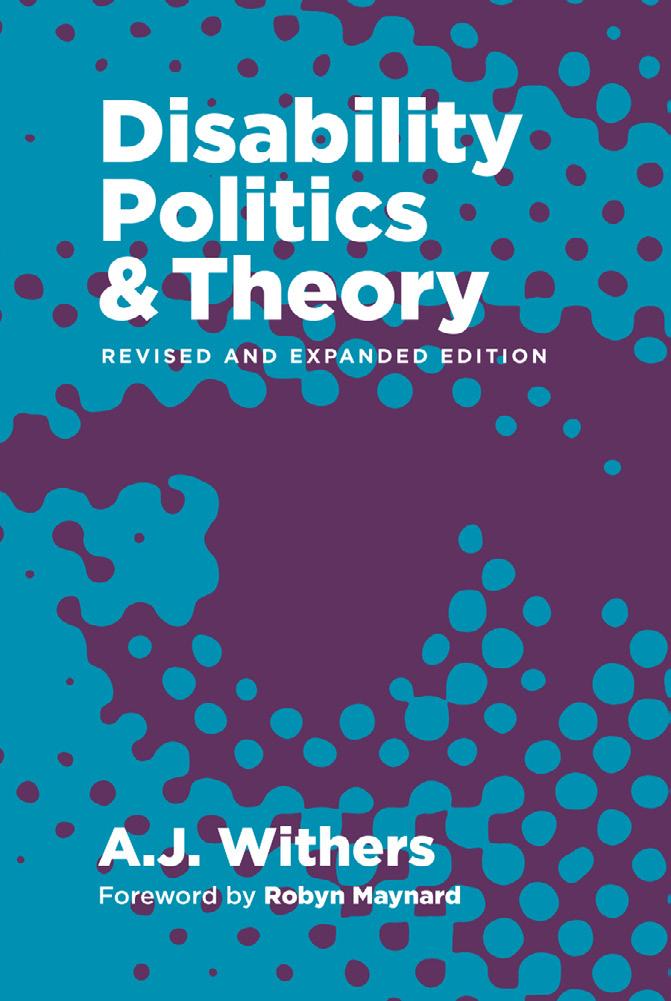
Paperback • 9781773635675
$29.00 • May 2024
Digital Format • $28.99
6 x 9" • 200 pages • Rights: World subject categories
social science / People with Disabilities
social science / Social Work
social science / Diseases & Health issues
by A.J. Withers foreword by Robyn Maynard
This is a book written for action- whether the action is debating it and with it, learning and unlearning, being angry, getting messy, sharing with others, building community or organizing.
—Liat Ben-Moshe, is a disability scholar and assistant professor of criminology, Law, and Justice at the University of Illinois at Chicago.
Disability oppression is not simply about making people disabled by not accommodating impairment; it is interlocked with capitalism, cisheteropatriarchy, colonialism and racism.
key content highlights
Building Models and Constructing Disability • Constructing Difference, Controlling Deviance: The Eugenics Model • Diagnosing People as Problems: The Medical Model • Being Pushed into Normalcy: The Rehabilitation Model • For Us, Not with Us: The Charity Model • Revolutionizing the Way We See Ourselves: The Rights and Social Models • Looking Back but Moving Forward: The Radical Disability Model and Disability Justice
Disability Politics and Theory, a historical exploration of the concept of disability, covers the late nineteenth century to the present, introducing the main models of disability theory and politics: eugenics, medicalization, rehabilitation, charity, rights and social and disability justice. A.J. Withers examines when, how and why new categories of disability are created and describes how capitalism benefits from and enforces disabled people’s oppression. Critiquing the currently dominant social model of disability, this book offers an alternative. The radical framework Withers puts forward draws from schools of radical thought, particularly feminism and critical race theory, to emphasize the role of interlocking oppressions in the marginalization of disabled people and the importance of addressing disability both independently and in conjunction with other oppressions. Intertwining theoretical and historical analysis with personal experience, this book is a poignant portrayal of disabled people in Canada and the US — and a call for social and economic justice. This revised and expanded edition includes a new chapter on the rehabilitation model, expands the discussion of eugenics and adds the context of the growth of the disability justice movement, Black Lives Matter, calls for defunding the police, decolonial and Indigenous land protection struggles, and the COVID-19 pandemic.
a.j. withers organized with the Ontario Coalition Against Poverty for over 20 years, including as a paid organizer. They are the author of Fight to Win: Inside Poor People’s Organizing, A Violent History of Benevolence: Interlocking Oppression in the Moral Economies of Social Working and numerous other articles and book chapters. They are the Ruth Wynn Woodward Jr. Chair in Gender, Sexuality and Women’s Studies at Simon Fraser University.
politics of health; political economy of health; wellness; oppression and illness; racialized illness; discrimination and illness; patriarchy and illness; medical control; eugenics; medical diagnosis; rehabilitation; movement

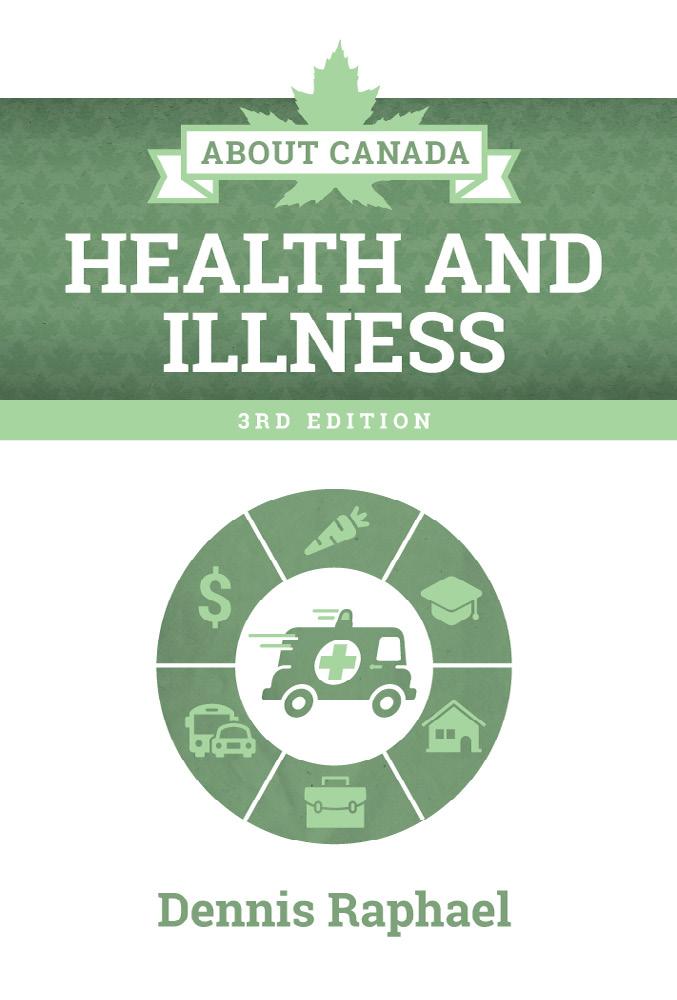
by Dennis Raphael
5 x 7"
Paperback • 9781773636603
$20.00 • May 2024
Digital Format • $19.99
Inequality, discrimination and oppression make us sick. Collective caring will go further in making us healthy than “wellness lifestyles”: the rich are getting richer, the rest of us are getting sick.
Living a long, healthy life is one obvious goal of pretty much all of us. We are told, over and over, to change our “lifestyles” and accept that if we become ill, we have likely brought it on ourselves. Yet, hundreds of studies, over the past four decades, tell the real story: the living and working conditions we experience every day play a determining role in our health. How income and wealth, housing, education and adequate food are distributed, whether or not we are employed, and the working conditions we experience — not medical treatments nor so-called wellness lifestyles — determine whether we stay healthy or become ill. These living and working conditions reflect the social inequalities that are associated with social class, gender, race and other social locations in Canadian society.
The third edition of Health and Illness shows how inequitable distribution of the social determinants of health are determined by public policy decisions. Dennis Raphael updates information that connects health and illness to the worsening levels of inequality in Canada. This edition also includes a chapter on the social determinants of who got sick and died from COVID-19. The experiences during the COVID-19 pandemic make the clear case that we need to restructure work and living conditions through public policy that more equitably distributes economic resources. It is only through such actions that we will be able to promote the health of Canadians and prevent illness in an effective manner.
The about canada series is an accessibly written and affordable collection of books that explore cultural and political issues that are central to our Canadian identity.
dennis raphael is a professor at the School of Health Policy and Management at York University. He is the editor of Social Determinants of Health: Canadian Perspectives, Tackling Health Inequalities: Lessons from International Experiences and Immigration, Public Policy, and Health: Newcomer Experiences in Developed Nations. He is author of Poverty in Canada: Implications for Health and Quality of Life, co-author of The Politics of Health in the Canadian Welfare State and co-editor of Staying Alive: Critical Perspectives on Health, Illness and Health Care.
politics of health; political economy of health; wellness; discrimination and illness; oppression and illness; racialized illness; patriarchy and illness; poverty and illness


Paperback • 9781773637600
$29.00 • Forthcoming October 2025
Digital Format • $28.99
6 x 9" • 224 pages • Rights: World
by Tonya K. Davidson
subject categories
Social Science / Cultural & Ethnic Studies Social Science / Urban Travel / Canada / Ontario (ON)
Ottawology offers an original, accessible sociological account of social structures, socialities, ecologies and everyday life in Ottawa.
Ottawa is often understood only as the seat of the federal government, marked by the neo-Gothic parliament buildings on the hill and the many government office buildings. Lively, erudite and exciting, Ottawology offers a unique and radical approach to studying the city, injecting it with intrigue and verve, and expanding collective, narrow understandings of Canada’s capital city. Tonya Davidson takes readers on a wide-ranging journey through a city populated not only by power brokers, but also workers, students, seniors, trees, eels, turtles, skaters and rabble rousers. Davidson applies her prodigious sociological imagination to critically explore an essential, but little understood, city. Davidson’s Ottawa offers a fascinating template for how to scrutinize the interactions between the weight of history and the effervescent motion of everyday life in a city. She draws surprising connections, from the role of the civil service to the acceleration of suburban sprawl, and the one-time incredible success of the city’s bus-rapid transit system, to stories of nightlife, policing, play, libraries, rivers and malls. Davidson traverses the city’s streets and hidden histories to show how social structures, sustainability and social life intersect, creating an elegant chronicle of the city’s rich and fraught social life.
key content highlights
Settler Colonial Capital • Trees • Play • School • Work • The Civil Service • Health • Getting Housed • Home • Suburbia • Transit • Security, Surveillance, and Incarceration • Markets and Malls • Libraries • Swimming and Skating • Goodnight Ottawa
Tonya K. Davidson has spent many years living in, teaching in and studying Ottawa. She is an associate professor of sociology in the Department of Sociology and Anthropology at Carleton University, where she has taught introduction to sociology, a sociology of Ottawa course for first-year students, urban sociology and a variety of sociology of Ottawa courses in Carleton University’s Lifelong Learning program. These experiences shaped her broad-ranging interest in the sociology of Ottawa, including its parks, schools, workplaces and bars.
Ottawa; Canada; cultural sociology; urban studies; bytown; settler colonialism; urban history; national capital; Byward Market; Ottawa river; Carleton University; city guide


Paperback • 9781773637662
$32.00 • Forthcoming September 2025
Digital Format • $31.99
6 x 9" • 224 pages • Rights: World
by Luna Vives
A truly remarkable book. With expertise, experience and skill, Luna Vives weaves together her impressive findings and offers a serious advance in state-of-the-art research.
—Maurice Stierl, Institute for Migration Research and Intercultural Studies, Osnabrück University
This book will flourish in the world. Vives’ writing style bridges deep research and theoretical underpinnings with real world examples.
—Petra Molnar, Associate Director, Refugee Law Lab, York University and author of The Walls Have Eyes: Surviving Migration in the Age of Artificial Intelligence
subject categories
Social Science / Emigration & Immigration
Social Science / Human Geography Political Science / Geopolitics
The Gates of the Sea explores how the Spanish government is reclaiming search and rescue assets to keep migrants out of its territory — and how rescue workers resist becoming border enforcers.
The Gates of the Sea examines the paradoxes of maritime search and rescue at Europe’s frontier. Focusing on Spain, Luna Vives explores how governments have redefined maritime rescue systems towards border control. Caught between their duty to protect life at sea and state efforts to transform them into border enforcers, rescuers have pushed back, primarily through their anarcho-syndicalist union. Committed to border abolition and international solidarity, the rescuers’ struggle positions them within a global movement of resistance to the politics of organized abandonment along Europe’s external borders. Vives’ revelatory, deeply researched and accessible book grapples with both state methods of control and containment and, crucially, ways in which solidarity activism can thrive in unexpected places.
key content highlights
Sea Migration and the Politics of a Manufactured Crisis • Defining Safety, Jurisdiction, and Responsibility at Sea throughout the 20th Century • The Origins of Salvamento Marítimo • The Western Mediterranean • The Canary Islands • The Rescuers’ Union: Resistance from Within • Death, Resistance, Hope
Luna Vives is a political geographer and associate professor in the Department of Geography, Université de Montréal. Her research explores how governments in the European Union and North America use borders to filter people and exclude certain groups of migrants. Her work has been published in several academic journals, including Geopolitics, Political Geography, the Journal of Ethnic and Migration Studies, Environment and Planning C and Politics and Space. She also contributes regularly to print media and radio. Her current research focuses on the use of drones and atmospheric and low earth orbit satellites to watch over the border.
migration; border; Europe; unions; activism; European Union; Schengen; refugees; Fortress Europe; surveillance; geography; geopolitics; displacement; colonialism; law of the sea; detention


Paperback • 9781773637563
$29.00 • Forthcoming November 2025
Digital Format • $28.99
6 x 9" • 224 pages • Rights: World
Request Exam Copy
subject categories
Language Arts / Communication Studies
Social Science / Social Theory History / Social History
by Scott Neigh
key content highlights PART 1
What Listening Is • Listening Practices • Listening to Each Other • Listening Weaves the World PART 2
Listening’s Reach and Limits • The Scream and the Murmur • Failures and Harms PART 3
Listening and Change • Everyday Resistance • Collective Movements • Learning from Movements
An examination on how listening shapes who we are, weaves the world and grounds our movements for justice and liberation.
Scott Neigh expands our understanding of "listening" as not an individual, passive act but as inherently fundamental to constructing a socially just world. He walks us through his learning as a frontline activist, journalist and host of Talking Radical Radio and shares what he's learned from decades of conversing with other activists and scholars. What does it mean to find oneself centred in a world in turmoil, as news of genocide, climate change and police violence increases to quell social movements? Neigh reflects deeply on the role of listening from the moment of injustice to how we respond as individuals, through to the formation of collective social movements — what these movements are, how they work, what they do in the world, the knowledge generated in and by them and the importance of listening to and within them. By listening effectively, we explicitly centre sensory pathways to understanding and may derive greater strategies for our collective liberation as embodied and situated knowers.
Scott Neigh got involved in social movements as an undergraduate student in the 1990s. These days, most of his involvement centres on building movement infrastructure, particularly related to grassroots and independent media. He has written and edited movement-focused grassroots journalism for 25 years. He did an oral history project in which he interviewed 50 long-time activists from across so-called Canada and published two books based on that work. For a decade, he was the host and producer of Talking Radical Radio, which broadcast on community stations across the country.
talking radical radio; grassroots; standpoint; activism; organizing; epistemology; learning; listening; social organization


by Arnel M. Borras
Uncovers the root causes of health and health care inequities, including unequal wealth and power among policy advocates, the dominance of big business and neoliberal state policies.
What sets this work apart is its explicit argument that capitalism, integrally imbricated with (neo)colonialism, racism and sexism, is the fundamental driver of health and healthcare inequalities. The book provides an in-depth examination of these inequities, delving into the interplay between power dynamics, policy advocacy, evidence-based research and political economy. It uniquely integrates document and interview data to critically analyze how inequalities related to class, race, ethnicity and gender contribute to health inequities. By exploring the roles of various social systems — economic, political, cultural, and institutional — the book exposes the complex mechanisms perpetuating these disparities. It challenges prevailing narratives by advocating for socialist-oriented solutions, offering a distinctive perspective compared to other literature in the field. The book presents complex concepts in an understandable manner, making the issues of health inequities and social justice approachable for non-specialists. It is essential reading for those seeking real answers and new directions in dealing with health inequalities.
Arnel M. Borras is an assistant professor at the Rankin School of Nursing, St. Francis Xavier University. Arnel’s professional journey reflects his dedication and resilience, beginning with his family’s immigration to Canada in 2008. Starting as a factory labourer, he transitioned into health care, serving as a personal support worker, registered practical nurse and registered nurse.
capitalism; work; health; welfare state systems; neoclassical; Keynesian; trade unions; Marxist; nexus of capitalism; racism; sexism colonialism; health divide


Paperback • 9781773636658
$32.00 • May 2024
Digital Format • $31.99 6 x 9" • 256 pages • Rights: World
by Peyman Vahabzadeh
subject categories
political science / Colonialism & Post-Colonialism
social science / Middle Eastern Studies
political science / World / Middle Eastern
This book offers a fascinating and historically important account of the little-known struggle of Iran’s Turkmen peasant movement for collective control over land, democracy and cultural revival.
For Land and Culture offers the first comprehensive account of a long forgotten and neglected grassroots movement. In the wake of Iran’s 1979 revolution, Turkmen peasants collectively occupied their ancestral lands, which had been seized through colonial modernization, land registry and land reform under the Pahlavi monarchy. The book chronicles this movement using theoretical and historical engagement with the modern councils and offers a detailed account of the “land question” in Iran’s colonial modernization. The book describes the systematic dispossession of Turkmen communities from some of the most fertile areas in Iran. Vahabzadeh shows how Turkmen land occupation in 1979 led to a sophisticated council system that offered a practical politics of semi-autonomous, democratic self-governance in the face of hostile militias and other forces of the nascent authoritarian Islamic Republic. With social justice as one of its unshakable pillars, the Turkmen council movement took back land as commons and abolished capitalist private ownership of land, providing an alternative to top-down politics until it was defeated by the state through a combination of military terror and assimilation. Although short lived, the radically democratic movement connected with global struggles of Indigenous Peoples and autonomous movements that had broken away from patriarchal state forms and capitalist domination.
key content highlights
Against Oblivion • Historical and Conceptual Preparations for the Study • Dispossession, Appropriation and Repressive Development • Land Is Life: The Prolonged Dispossession of Turkmens • The Turkmen Council Movement: Advent, Challenges, Thriving • Expansion, Repression, Assimilation • A World-Historical Movement: Turkmens’ Radical Democratic Experience
peyman vahabzadeh is a professor of sociology at the University of Victoria. He is the author of several books, including The Art of Defiance: Dissident Culture and Militant Resistance in 1970s Iran, Violence and Nonviolence: Conceptual Excursions into Phantom Opposites and A Rebel’s Journey: Mostafa Sho‘aiyan and Revolutionary Theory in Iran. He is also editor of Iran’s Struggles for Social Justice: Economics, Agency, Justice, Activism and co-editor of Crossing Borders: Essays in Honour of Ian Angus. He has published nine books of poetry, fiction, literary criticism and memoir in Persian, and his works have appeared in English, Persian, German, Kurdish, French and Spanish.
Islamic Republic; Kurdistan; Fadai Guerrillas; Persian; Azeri Turkish; constitutional revolution; commune; Paris Commune; Kobane; Zapatistas


by Peter Ives
This is the book we need right now. Ives has found a way to make the complex philosophical and political terrain of these debates comprehensible and compelling for all readers.
—Dr. Shannon Dea, dean of arts and professor, University of Regina
This timely, important and accessible book offers both a scholarly overview of and a close critical engagement with freedom of expression, in a way that helps readers move past naïve, monolithic and dogmatic accounts. Pick this book up, and you won’t put it down until you’re done!
—Eve Haque, professor, York University
We need to rethink free speech to better address diverse goals from knowledge production to democratic participation and individual expression.
Clashes over free speech rights and wrongs haunt public debates about the state of democracy, freedom and the future. While freedom of speech is recognized as foundational to democratic society, its meaning is persistently misunderstood and distorted. Prominent commentators have built massive platforms around claims that their right to free speech is being undermined. Critics of free speech correctly see these claims as a veil for misogyny, white supremacy, colonialism and transphobia, concluding it is a political weapon to conserve entrenched power arrangements. But is this all there is to say? Rethinking Free Speech will change the way you think about the politics of speech and its relationship to the future of freedom and democracy in the age of social media. Drawing on political philosophy and everyday examples, Ives takes the reader on a journey through the hotspots of today’s raging speech wars. In its bold and careful insights on the combative politics of language, Rethinking Free Speech provides a map for critically grasping these battles as they erupt in university classrooms, debates around the meaning of antisemitism, the “cancelling” of racist comedians and the proliferation of hate speech on social media.
Peter Ives is professor of political science at the University of Winnipeg. He authored Gramsci’s Politics of Language and Language and Hegemony in Gramsci, and is co-editor of Gramsci, Language and Translation and Language Policy and Political Theory. He has published in Rethinking Marxism, Political Studies, Critical Review of International Social and Political Philosophy and Language Policy. He researches and writes on the politics of “global English” and bridging the disciplines of language policy and political theory. He has contributed articles to The Conversation on free speech and academic freedom, was on the editorial board of Rethinking Marxism for a decade and was on the editorial collective of Arbeiter Ring Press for many years.
free speech absolutism; free speech warriors; political correctness; identity politics; woke-ism; Oliver Wendel Holmes; Voltaire

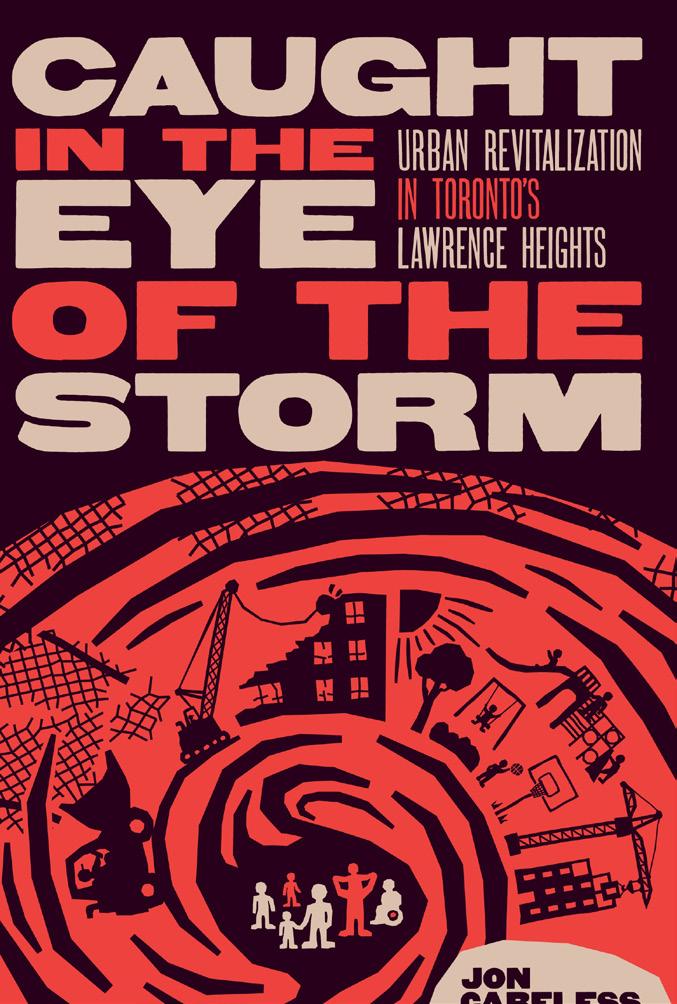
by Jon Careless
A historical account of a public housing community struggling and persevering in the face of stigmatization, oppression and urban revitalization.
This book is a case-study analysis of the public housing district of Lawrence Heights in North York, Toronto, a neighbourhood undergoing the largest revitalization in Canada. The book presents a chronological narrative of change and upheaval in Lawrence Heights, beginning with its origins after World War Two as a modernist style “city on a hill” that was intended to help remedy Toronto’s affordable housing shortage and simultaneously transform its systemically disadvantaged tenant base into idealized members of the middle class. As the community became progressively more racialized and oppressed in the late twentieth century, the reputation of Lawrence Heights and its occupants became steadily more denigrated by the forces of stigmatization, governmental neglect and police brutality. In this milieu, local political officials and private developer partners have striven to tear Lawrence Heights down and rebuild it into a socially mixed neighbourhood. This plan threatens the existing social fabric of a proud and politically active community.
Jon Careless is a researcher of urban issues, including homelessness and urban revitalization, with a primary focus on the city of Toronto, where he lives. He has a PhD in political science from York University and works as a senior policy advisor for Ontario Public Service.
urban; revitalization; city; settler; North York; post WWII; social housing; financing; LHION; stigmatization; gentrification; stigma; racism


by Sarah Marie Wiebe foreword by Rachel yacaaʔał George
Rooted in her own experience of the climate crisis as a new mother, Wiebe bravely guides her reader through the mess of our times; this mess is sometimes joyful, sometimes painful, and always hot. Timely and gripping, this book is a powerful rallying cry for radical care.
—Rebecca Hall, author of Refracted Economies: Diamond Mining and Social Reproduction in the North
Wiebe’s critical ecofeminist and maternal analysis delves into the slow sensory politics of crisis, demonstrating how the messiness of our scaling grief is intimately tied to structures of neoliberalism, settler colonialism, patriarchy, racism, capitalism and global extractivism.
—Jeffrey Ansloos, associate professor, University of Toronto
A story of mothering amidst a climate crisis to shape futures that will flourish under the politics of care.
The summer after giving birth, Sarah Marie Wiebe and her baby endured the 2021 heat dome in British Columbia, the deadliest weather event in Canadian history. The extreme heat landed Wiebe in the hospital and marked the beginning of a year of mothering through heat, fires and floods. The climate emergency’s many incarnations shaped Wiebe’s politics of parenting and revealed the layers, textures and nuances of the disastrous emergencies we encounter in a world dominated by extractive capitalism. Drawing on hospital codes to explore the connections, Wiebe opens up tender conversations about intimate matters of how our bodies respond to emergency interventions: informed consent, emergency C-sections, reproductive mental health, and anti-colonial and anti-racist resistance. A critical ecofeminist scholar, Wiebe invites collective envisioning and enacting of caring, ethical relations between humans and the planet, including our atmospheres, lands, waters, animals, plants and each other.
A State of Emergency as an Embodied Event • Feminist Motherhood in a World on Fire • Cultivating Community Through Disasters • A Crash ‘n Splash Caesarian • Living Through Multiple Crises, Climate Anxiety and Mental Health • Circular Economies of Care • Systemic Threats, Revealing Violences Slow and Spectacular • A Cautionary Tale of Renewable Extraction • Cultivating Care and Community through Multifaceted Crises
Sarah Marie Wiebe grew up on Coast Salish territory in British Columbia, BC. She is an assistant professor in the School of Public Administration at the University of Victoria and an adjunct professor at the University of Hawai'i, Mānoa with a focus on community development and environmental sustainability. She is a co-founder of the FERN Collaborative (Feminist Environmental Research Network) and author of various books, including Life Against States of Emergency: Revitalizing Treaty Relations from Attawapiskat and Everyday Exposure: Indigenous Mobilization and Environmental Justice in Canada's Chemical Valley. She is also co-editor of Biopolitical Disaster and Creating Spaces of Engagement.
parenting; climate emergency; ecofascism; ecofeminism; extractive capitalism; extraction; politics of care; social reproduction theory; democracy; greenwashing; wildfires; state of emergency; flooding; Hawai’i


Paperback • 9781773636689
$35.00 • March 2024
Digital Format • $34.99
6 x 9" • 288 pages • Rights: World
edited by Katrin Roots, Ann De Shalit and Emily van der Meulen
A long-overdue critical assessment of Canada’s dominant anti-trafficking approaches that is made particularly valuable by featuring stories of people with first-hand experience of antitrafficking responses.
—borislav gerasimov, editor, Anti-Trafficking Review
Based on empirical research with various marginalized populations, this book presents powerful details about the harms they experience due to anti-trafficking interventions and representations. It is a timely and persuasive collection.
—kamala kempadoo, professor emerita, York University, and co-editor of White Supremacy, Racism and the Coloniality of Anti-Trafficking
subject categories
social science / Criminology
social science / Emigration & Immigration
social science / Women’s Studies
A stellar collection of scholars, activists and affected individuals who offer a much-needed critical perspective on Canada’s anti-trafficking efforts and their wide-ranging impacts.
key content highlights
TraFFicking Discourses and Representations Antiblackness as the Structure of Anti-Trafficking Discourse • Emergence and Convergence of the Pimp and Trafficker in Media Discourse • A Narrative on AntiTrafficking Discourse and Advocacy in Newfoundland TraFFicking Law and Prosecutions
Problems and Pitfalls in the Post-PCEPA Era • Exacerbating Racial and Gendered Violence in Ontario • Targeting Asian Massage Parlours in the Name of Anti-Trafficking • Narrative on Defending People Charged with Human Trafficking • Narrative on Being Charged with Human Trafficking TraFFicking Policing and Surveillance Anti-Trafficking and Data-Driven Policing • Anti-Trafficking Policing in Vancouver • Challenging Notions of Benevolence and Protection • Narrative on Being an Indigenous and Trans Sex Worker in Winnipeg TraFFicking and Migrant Labour Exploitation Discretionary Decisions in Immigration • Reconciling Human Trafficking Provisions with Canada’s Migrant Farm Work Program • Narrative on Organizing for Migrant Farm Worker Justice
Amid the proliferating scholarship and often sensational public campaigns, Trafficking Harms offers fresh insights and critical analyses. The collection’s four thematic areas — Discourses and Representations; Law and Prosecutions; Policing and Surveillance; Migrant Labour Exploitation — examine an array of issues, including the contested definitions of human trafficking, the application of trafficking law and policy, the conflation of sex work and trafficking, the impacts of anti-trafficking frameworks on racialized communities and questions around “victims” and “traffickers.” This book is the first of its kind in Canada, showcasing a diverse group of academics, legal advocates, frontline activists who work with migrant and sex-working communities, individuals who have been charged and/or convicted of trafficking offences and those who are directly impacted by trafficking law and policing.
katrin roots is an assistant professor of criminology at Wilfrid Laurier University and author of The Domestication of Human Trafficking: Law, Policing and Prosecution in Canada. She has is also the co-author of numerous peer-reviewed articles and book chapters researching Canada’s anti-trafficking efforts.
ann de shalit is an assistant professor of gender and social justice at Trent University. She has published numerous articles and reports, has presented at conferences and government consultations and is involved in community-based research and campaigns.
emily van der meulen is a professor of criminology at Toronto Metropolitan University and co-editor of numerous books, including Red Light Labour: Sex Work Regulation, Agency, and Resistance and Making Surveillance States: Transnational Histories
migration; borders; legal studies; sex workers; exploitation; Indigenous; Black; racialized communities; “white slavery panic”; modern-day slavery; Latin America; immigration policies; United Nations Trafficking Protocol


Paperback • 9781773632254
$27.00 • July 2023
Digital Formats • $26.99 6 x 9" • 320 pages • Rights: World
by Mostafa Henaway foreword by Harsha Walia
subject categories
political science / Public Policy / Immigration
social science / Emigration & Immigration law / Emigration & Immigration
With massive expansion of precarious work under neoliberalism, migrant workers are challenging conditions of their hyper-exploitation through struggles for worker rights and justice.
In recent years, waves of migration from the Middle East, Latin America and Africa to Europe and North America have been met with a corresponding rise in antiimmigrant, far-right populism in host countries, placing the question of migration at the forefront of politics and social movements. In this sweeping account, Henaway seeks to understand these patterns through contextualizing global migration within a history of global capitalism, class formation and the financialization of migration. As globalization intensifies, workers everywhere are forced to compete for wages — not through foreign investment and outsourcing, but through an increasingly mobile working class. Henaway rejects the dominant responses of restricting or “managing” migration through temporary worker programs, proposing that stopping a race to the bottom for all working people involves building solidarity with migrant worker struggles for decent work and justice.
Through examining the organizing strategies of migrant workers at giants like Amazon and Walmart as well as discount retailers like Dollarama, the immense power and agency of precarious workers in global platform companies like Uber, the successful resistance of taxi drivers and fast food workers around the world, and the contemporary mass labour movement organized by new unions and workers’ centres, Henaway shows how migrant demands and strategies can help shape radical working-class politics.
key content highlights
Essential Yet Disposable • Global Migration at the Heart of Global Capitalism • Neoliberal Migration Takes Hold • Keeping Global Capitalism Afloat • Border Militarization, Internalization and Externalization • Managing Migration • Precarious Work Requires Precarious Workers • From Farm to Table. • Just-in-Time Workers for Just-in-Time Distribution • The Gig Is Up • New Forms of Organizing • Migrant Organizing on the New Fault Lines of Global Capitalism • Migrant Workers Fight for the Entire Working Class • Striking for Status • The Long Struggle for Status • Freedom of Movement for People, Not Capital
mostafa henaway, a Canadian-born Egyptian, is a long-time community organizer at the Immigrant Workers Centre in Montreal, where he has been organizing for justice for immigrant/migrant workers for over two decades. He is also a researcher and PhD candidate at Concordia University.
labour; activism; neoliberalism; racial capitalism; British; visa; Palestine; Afghanistan; Iraq; nafta; Philippines; deportation; financialization; Yes We Can!; border security


Paperback • 9781552662816
$25.00 • September 2008
$24.99 • Digital Formats 6 x 9" • 144 pp • Rights: World subject categories social science / Indigenous Studies
/ Social Work
by Shawn Wilson
On the Research Journey • Can a Ceremony Include a Literature Review? • The Elements of an Indigenous Research Paradigm • Relationality; Relational Accountability • Articulating an Indigenous Research Paradigm
This book describes a research paradigm shared by Indigenous scholars in Canada and Australia, and demonstrates how this paradigm can be put into practice.
Indigenous researchers are knowledge seekers who work to progress Indigenous ways of being, knowing and doing in a modern and constantly evolving context. This book describes a research paradigm shared by Indigenous scholars in Canada and Australia, and demonstrates how this paradigm can be put into practice.
Relationships don’t just shape Indigenous reality; they are our reality. Indigenous researchers develop relationships with ideas in order to achieve enlightenment in the ceremony that is Indigenous research. Indigenous research is the ceremony of maintaining accountability to these relationships. For researchers to be accountable to all our relations, we must make careful choices in our selection of topics, methods of data collection, forms of analysis and finally in the way we present information.
shawn wilson is Opaskwayak Cree from northern Manitoba. He is a community psychologist, researcher and educated Cree who spends his time teaching other Indigenous knowledge seekers (and his kids) how to accomplish this balancing act while still keeping both feet on the ground. He also works part-time for the Northern Rivers University Department of Rural Health in Lismore, NSW Australia, building research capacity with primary health care workers. He is the author of Gwitch’in Native Elders: Not Just Knowledge but a Way of Looking at the World, and is working on documenting his parents’ life stories. In addition to further articulating Indigenous philosophies and research paradigms, his research focuses on the inter-related concepts of identity, health and healing, culture and wellbeing.
Indigenous research paradigm; Indigenous scholars conference; relationality; Indigenous axiology; cultural knowledge


Paperback • 9781773634524
February 2021 • $27.00
Digital Formats • $26.99
6 x 9" • 320 pp • Rights: Canada
by Harsha Walia
A book of unsparing truth and dazzling ambition that provides readers with desperately needed intellectual ammunition to confront the inherent violence of borders. An enormous contribution.
—naomi klein, author of On Fire
A clear and incisive must-read, sure to become a classic, for those of us concerned with building a world premised on freedom of movement, against and beyond the logics of the nation-state.
—robyn maynard, author of Policing Black Lives
Your understanding of the world will shift... Walia’s critical intervention couldn’t be better timed.
—astra taylor author of Democracy May Not Exist, but We’ll Miss It When It’s Gone
One of North America’s foremost thinkers and immigrant rights organizers delivers an unflinching examination of migration as a pillar of global governance and gendered racial class formation.
subject categories
political science / General
key content highlights
Historic Entanglements of US Border Formation • US Wars Abroad, Wars at Home • Dispossession, Deprivation, Displacement: Reframing the Global Migration Crisis • Bordering Regimes; Australia and the Pacific Solution • Fortress Europe • Temporary Labour Migration and the New Braceros • The Kafala System in the Gulf States • Permanently Temporary: Managed Migration in Canada; Mapping the Global Far Right and the Crisis of Statelessness • Refusing Reactionary Nationalisms
Harsha Walia disrupts easy explanations for the migrant and refugee crises, instead showing them to be the inevitable outcomes of conquest, capitalist globalization and climate change generating mass dispossession worldwide. Border and Rule explores a number of seemingly disparate global geographies with shared logics of border rule that displace, immobilize, criminalize, exploit and expel migrants and refugees. With her keen ability to connect the dots, Walia demonstrates how borders divide the international working class and consolidate imperial, capitalist, ruling-class and racist nationalist rule. Ambitious in scope and internationalist in orientation, Border and Rule breaks through American exceptionalism and liberal responses to the migration crisis and cogently maps the lucrative connections between state violence, capitalism and right-wing nationalism around the world. Border and Rule is a must-read in these difficult times of war, inequality, climate change and global health crisis, and a clarion call for revolution.
harsha walia is a South Asian activist and writer based in Vancouver, unceded Coast Salish Territories. She has been involved in community-based grassroots migrant justice, feminist, anti-racist, Indigenous solidarity, anti-capitalist, Palestinian liberation, and anti-imperialist movements, including No One is Illegal and Women’s Memorial March Committee. She is formally trained in law, works with women in Vancouver’s Downtown Eastside and is the author of Undoing Border Imperialism.
awards: 2022
BC and Yukon Prizes’s Jim Deva Award for Writing that Provokes
immigration; migration; refugee; right-wing nationalism; climate change; Canada; Europe; state violence; labour migration;

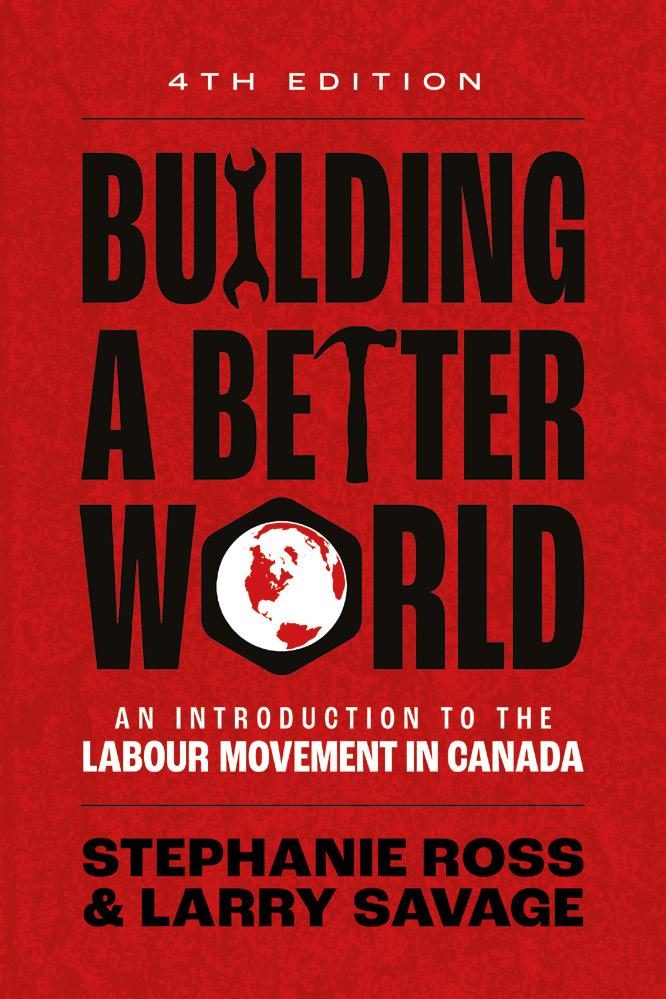
by Stephanie Ross and Larry Savage
Two of Canada’s foremost experts in labour studies detail the evolving struggle of Canadian workers to defend themselves under capitalism. Workers wanting to organize as well as students of labour studies will find this book essential reading.
—peggy nash, former senior unifor negotiator and former MP, now a senior advisor at Toronto Metropolitan University
Understanding Unions • Early Union Struggles in Canada • Union Breakthroughs and Challenges • Unions in the Workplace • Unions and Political Action • How Do Unions Work? • What Difference Do Unions Make? • Who Belongs to Unions? Who Doesn’t and Why? • The Future of Unions
A key introduction to the history, role, strategies and contributions of unions and the labour movement in Canada, now with a discussion of the impacts of the covid-19 pandemic on the collective power of workers.
This fourth edition of Building a Better World offers a comprehensive introductory overview of Canada’s labour movement. The book explores why workers form unions; assesses their organization and democratic potential; examines issues related to collective bargaining, grievances and strike activity; charts the historical development of labour unions; and describes the gains unions have achieved for their members and all working people. This new and expanded edition also analyzes the challenges facing today’s labour movement as a result of COVID-19 and the strategies being developed to overcome them.
stephanie ross is director of the School of Labour Studies at McMaster University. larry savage is chair of the Department of Labour Studies at Brock University.
precarious work; collective agreement; collective bargaining; pay equity; strike; employment standards legislation; workers’ compensation; union organization; anti-discrimination laws; occupational health and safety


Paperback • 9781773635576
November 2022 • $18.00
Digital Formats • $17.99
5 x 7” • 174 pages • Rights: World
by Ajay Parasram and Alex Khasnabish
A gutsy, clear, compelling pep talk for the white anti-racist. The candour and focus on practice will reach many people.
—ardath whynacht, author of Insurgent Love
This book is a practical, readable, no-nonsense guide that takes a complex, emotionally charged, serious subject and makes it accessible and interesting. The authors do a masterful job of debunking mythologies in our everyday discourse and giving people the tools to respond.
—fern johnson & marlene fine, authors of Let’s Talk Race: A Guide for White People
"This book is a gift...clear, accessible, thoughtful, and often hilarious prose that provides context, breaks down examples, and leaves readers—especially white readers like myself—with a clear set of steps for recognizing and dismantling racism in their lives and broader communities.
—erin wunker, author of Notes from a Feminist Killjoy
With humour and compassion, this book offers relatable advice and a practical entry point into conversations about race.
subject categories
social science / Race & Ethnic Relations family & relationships / Race & Prejudice
key content highlights
Can you be racist against white people?
• How can I fix past mistakes without inadvertently making new ones? • How does racism relate to other kinds of oppression? • How can I make anti-racism part of my family life? • How can I talk about social justice without turning people off? • What’s the difference between cultural appropriation and cultural appreciation? • Can members of an oppressed group be oppressors as well? • How do I avoid being a “white saviour”? • How can I be anti-racist in my everyday life? • How can we build the world we all deserve? • The Race Card
Are you a white person with questions about how race affects different situations, but you feel awkward, shy or afraid to ask the people of colour in your life? Are you a racialized person who is tired of answering the same questions over and over? This book is for you: a basic guide for people learning about racial privilege. In Frequently Asked White Questions, Drs. Alex Khasnabish and Ajay Parasram answer ten of the most common questions asked of them by people seeking to understand how race structures our every day. Drawing from their lived experiences as well as live sessions of their monthly YouTube series Safe Space for White Questions, the authors offer concise, accessible answers to questions such as, “Is it possible to be racist against white people?” or “Shouldn’t everyone be treated equally?” This book offers a thoughtful and respectful guide for anyone trying to figure out “woke” politics without jargon and judgement.
ajay parasram is a multigenerational transnational byproduct of the British empire, with roots in South Asia, the Caribbean and the settler cities of Halifax, Ottawa and Vancouver. He is an associate professor in the Departments of International Development Studies, History and Political Science at Dalhousie University. His research interests surround the colonial present, or the many ways through which strings of historical colonial entanglements continue to tighten the limit of political action today, and how those strings might be undone. alex khasnabish is a writer, researcher and teacher committed to collective liberation living in Halifax, on unceded and unsurrendered Mi’kmaw territory. He is a professor in sociology and anthropology at Mount Saint Vincent University. His research focuses on radical imagination, radical politics, social justice and social movements.
BIPOC; race; white privilege; grassroots; public awareness; far-right; online bullying; multiculturalism; safe space for white questions; "white saviour"; race card


Paperback • 9781773635187
$70.00 • November 2022
Digital Formats • $69.99
6.75 x 9.25" • 512 pp • Rights: World subject categories
social science / Sociology / Social Theory
social science / Discrimination
edited by Jessica Antony, Wayne Antony and Les Samuelson
key content highlights
Matters of the State Still Matter: Political Power and Social Problems • Death by Colonialism • Keeping Canada White: Immigration Enforcement in Canada • The (Mis) Education of Black Youth: Anti-Blackness in the School System • Settler Colonialism and Indigenous Rights in Canada: Thinking With and Beyond a Human Rights Framework • The Medicine of Peace • Capitalism, Poverty and Poor People’s Resistance • Canada’s Corporate Food Regime: The Prospects for a Just Transition • The Future of Work? App-Based Workers and the Gig Economy • Fighting to Lose: Political Struggles for Climate Justice • Making Universities Safe for Women: Sexual Assault on Campus • Resisting Conformity: Women Talk About Their Tattoos • Hidden Rainbows in Plain Sight: Human Rights Discourse, Gender and Sexual Minority Youth • Crime as a Social Problem: Social Inequality and Justice • Embodied Oppression: The Social Determinants of Health
This new, expanded edition textbook explores how social inequality and oppression are what actually generate “social problems.”
Power and Resistance debunks the dominant neoliberal, hyper-individualist approach to society’s problems that sees poverty as a result of laziness, environmental crises as a result of market demands for products that pollute and Indigenous peoples’ struggles as a result of not assimilating. The authors argue that it is social inequality and oppression that are the underlying causes of social problems. In a society like ours, powerful groups make choices that benefit them and force those choices onto others, creating life problems for others and society as a whole. The powerful also have influence over what is and is not called a “social problem.” Solving social problems requires changing the structures of inequality and oppression. For example, industrial corporate agriculture has created huge profits for a few gigantic food corporations but left much of the world hungry. But farmers and their allies are pushing back through agroecology — an agriculture based on local, small-scale, ecologically sustainable farming that brings eaters and growers closer to one another.
The seventh edition of Power and Resistance includes new chapters on anti-Black racism in schools, Indigenous peoples and mental health, food security and sovereignty, and work in the gig economy.
jessica antony is a writer, editor and educator. She writes about interpersonal communication, freelance work and community arts; works with authors on manuscript development and editing; and teaches at the University of Winnipeg.
wayne antony is a publisher at Fernwood Publishing. He is a founding member of the Canadian Centre for Policy Alternatives–Manitoba, has worked with numerous political activist organizations and taught sociology at the University of Winnipeg for eighteen years.
les samuelson is a retired professor of sociology at the University of Saskatchewan. His research interests included justice reform, especially as it pertains to Indigenous peoples, as well as international crime, justice and human rights.
political organizing; social (in)justice; anti-Black racism; food security; sovereignty; oppression; inequality; social problems; activism; agroecology


Paperback • 9781773630571
$25.00 • April 2018
Digital Formats • $24.99 6 x 9" • 184 pp • Rights: World
by Ingrid R. G. Waldron
Reckoning with Canada’s denial of its colonial past, present and erasure of marginalized communities, this book is a must-read for anyone interested in the impacts of environmental racism here and beyond.
—elliot page
Uses Nova Scotia as a case study to examine the legacy and impacts of environmental racism and its health impacts in Indigenous and Black communities in Canada.
There’s Something in the Water examines the legacy of environmental racism and its health impacts in Indigenous and Black communities in Canada, using Nova Scotia as a case study, and the grassroots resistance activities by Indigenous and Black communities against the pollution and poisoning of their communities. Using settler colonialism as the overarching theory, Waldron unpacks how environmental racism operates as a mechanism of erasure enabled by the intersecting dynamics of white supremacy, power, state-sanctioned racial violence, neoliberalism and racial capitalism in white settler societies. By redefining the parameters of critique around the environmental justice narrative and movement in Nova Scotia and Canada, Waldron opens a space for a more critical dialogue on how environmental racism manifests itself within this intersectional context. This book illustrates the ways in which the effects of environmental racism are compounded by other forms of oppression to further dehumanize and harm communities already dealing with pre-existing vulnerabilities and documents the long history of struggle, resistance and mobilizing in Indigenous and Black communities to address environmental racism.
The Environmental Noxiousness, Racial Inequities & Community Health Project • A History of Violence: Indigenous & Black Conquest, Dispossession & Genocide in Settler Colonial Nations • Re-Thinking Waste: Mapping Racial Geographies of Violence on the Colonial Landscape • Not in My Backyard: The Politics of Race, Place & Waste in Nova Scotia; Sacrificial Lives: How Environmental Racism Gets Under the Skin • Narratives of Resistance, Mobilizing & Activism in the Fight Against Environmental Racism in Nova Scotia
ingrid r. g. waldron is an associate professor in the Faculty of Health at Dalhousie University and the director of the Environmental Noxiousness, Racial Inequities & Community Health Project (The enrich Project).
awards: 2020
Society for Socialist Studies’ Errol Sharpe Book Prize
settler colonialism; environmental racism; grassroots movements; Nova Scotia; environmental racism; geographies of violence; politics of race


Paperback • 9781552668788
October 2017 • $35.00
Digital Formats • $34.99
6 x 9" • 250 pp • Rights: World
by Adje Van De Sande and Karen Schwartz
subject categories
social science / Research
Argues that social research should not and cannot be value-free.
Most social research texts are written from an empiricist/positivist perspective, emphasizing the scientific method and the value of objectivity in research. While acknowledging that certain aspects of the scientific method should be preserved, Adje van de Sande and Karen Schwartz argue that social research should not and cannot be value-free. Researchers committed to social justice and social change need to support that commitment. This new edition of Research for Social Justice examines how the structural inequality perspective and anti-oppressive principles — which view the problems experienced by people as rooted in the social, political and economic structures of society — provide this support. Also included in this edition are updated and revised examples of research, a substantially revised chapter on Indigenous approaches to research, a chapter-by-chapter description of developing student projects in a research course and examples of student-led, community-based research projects.
key content highlights
Research as Politics • Research Paradigms • Research Ethics • Developing Research Proposals
• Research Partners • Participatory Action Research • Research with Indigenous People • Program Evaluations • Needs Assessments • Qualitative Methods • Quantitative Methods • Report Writing
adje van de sande is an associate professor at the School of Social Work at Carleton University.
karen schwartz is an associate professor at the School of Social Work at Carleton University.
community-based research; bias; informed consent; ocap; needs assessment; Likert scale

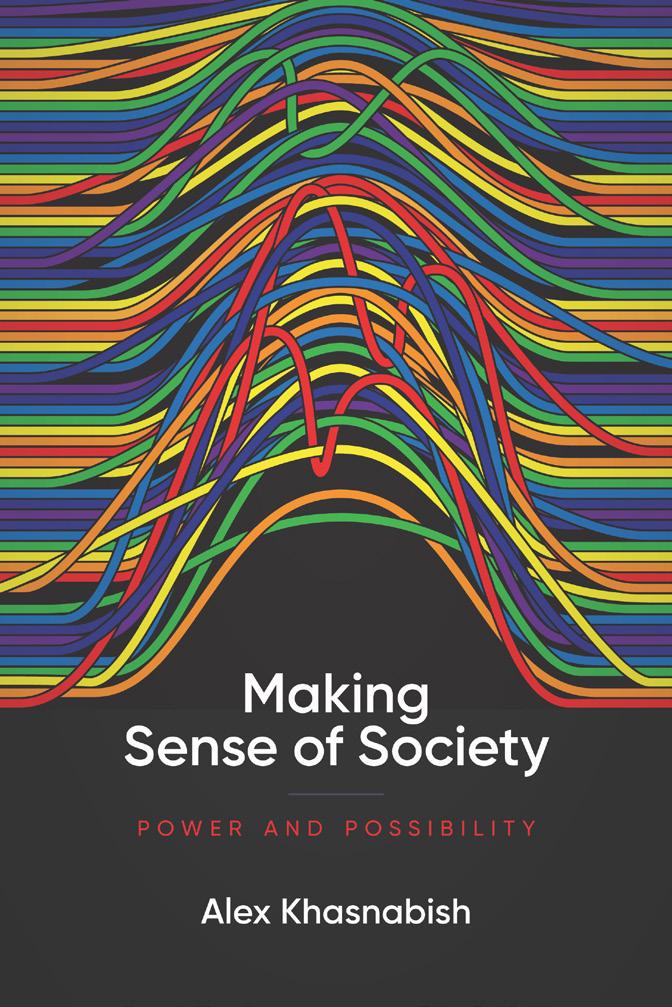
edited by Alex Khasnabish
A significant book, aiming to achieve an interdisciplinary examination of society. I would have assumed this to be overly ambitious, if not impossible. Reading the manuscript has convinced me otherwise. The author has produced an impressive contribution to social science textbook writing, one quite beyond anything else I have seen.
—michael
clow, St. Thomas University
A fresh and radical approach to introducing social thought to undergraduate social science students that reflects the excitement and verve of a field in transition.
Grounded in the sister disciplines of sociology and anthropology, this textbook is an accessible and critical introduction to contemporary social research. Alex Khasnabish eschews the common disciplinary silos in favour of an integrated approach to understanding and practising critical social research. Situated in the North American context, the text draws on examples to give readers a clear sense of the diversity in human social relations. It is organized thematically in a way that introduces readers to the core areas of social research and social organization and takes an unapologetically radical approach in identifying the relations of oppression and exploitation that give rise to what most corporate textbooks euphemistically identify as “social problems.” Focusing on key dynamics and processes at the heart of so many contemporary issues and public conversations, this text highlights the ways in which critical social research can contribute to exploring, understanding and forging alternatives to an increasingly bankrupt, violent, unstable and unjust status quo.
Becoming Human • Doing Social Research • Making Society • Who Are “We”?: Identity and Intersections • Living Together: Family, Kinship and Social Bonds • Making Meaning, Making Sense: Communication and Belief • Making a Living: Economies and Ecologies • Power and Order: Inequality, Injustice and Paths Beyond
alex khasnabish is a writer, researcher and teacher committed to collective liberation living in Halifax, Nova Scotia, on unceded and unsurrendered Mi’kmaw territory. He is a professor in sociology and anthropology at Mount Saint Vincent University. His research focuses on radical imagination, radical politics, social justice and social movements.
social theory; research practice; climate justice; social justice; intersectionality; social movements; critical social science; social reproduction; social justice


Paperback • 9781773634791
$26.00 • November 2021
Digital Formats • $25.99 6 x 9" • 224 pp • Rights: World subject categories
political science / Privacy & Surveillance social science / Women's Studies
Krys Maki
A compelling contribution to critical poverty studies that is told from the perspective of single moms on welfare and the caseworkers who are mandated to implement these punishing regulations. Anyone who says they care one tiny morsel about the poor needs to read this book.
—margaret little, Queen’s University, and the author of the award-winning No Car, No Radio, No Liquor Permit
While surveillance of the poor is not a new form of social control, Krys Maki shows how new technologies have intensified the gaze of both state and non-state actors. This highly readable and compelling book deftly examines an area of social policy too often overlooked.
—janet
e. mosher, Osgoode Hall Law School
A comprehensive examination of welfare state surveillance and regulation of single mothers in Ontario.
While the poor have always been monitored and surveilled by the state when seeking financial support, the methods, techniques and capacity for surveillance within and across government jurisdictions has profoundly altered how recipients navigate social assistance. Welfare surveillance has exacerbated social inequality, especially among low income, Indigenous and racialized single mothers. Krys Maki unpacks in-depth interviews with Ontario Works caseworkers, anti-poverty activists and single mothers on assistance in Kingston, Peterborough and Toronto, and employs intersectional feminist political economy and critical surveillance theory to contextualize the ways neoliberal welfare reforms have subjected lowincome single mothers to intensive state surveillance.
key content highlights
Brief History of Ontario’s Neoliberal Welfare Reforms (1995–2015) • Women’s Poverty, Stigmatization and ‘“Othering” • Welfare Surveillance and Mothering on the Margins • Caseworkers and Welfare Surveillance • Individual and Collective Resistance • Government and Non-Government Surveillance Practices • Family Court and Family Responsibility Office: Surveillance and Sexual Regulation • The Children’s Aid Society and the Ongoing Colonization of Indigenous Women and Children • Community Surveillance, Gossip and Perpetual Blackmail
This book also examines the moral and political implications of administering inadequate benefits alongside punitive surveillance measures. Despite significant restraints, anti-poverty activists, caseworkers and recipients have discovered individual and collective ways to resist the neoliberal agenda.
krys maki is an activist scholar specializing in mixed-methods, community-based participatory research. They currently work as the research and policy manager at Women’s Shelters Canada, a national network of violence against women shelters based in Ottawa.
women; poverty; surveillance; neoliberal social policy; shrinking welfare state; privatization; inequality; discrimination; oppression; social work; casework; anti-poverty; activism; resistance


Paperback • 9781773631141
$45.00 • June 2020
Digital Formats • $44.99
6 x 9" • 538 pp • Rights: World
by Tyler A. Shipley
The book fundamentally disrupts the notion that Canada is a benevolent, helpful, middle power, and sets the record straight on the colonial and imperial aspects of the Canadian state.
—david p. thomas, author of Bombardier Abroad
Shipley’s outstanding scholarship is matched by the accessibility of his writing; this book will reach across audiences of all varieties, as it deserves.
—veldon coburn, University of Ottawa
An accessible, empirically rich introductory textbook to Canada's engagements in the world since confederation that charts a unique path by locating its colonial foundations at the heart of the analysis.
Canada in the World begins by arguing that the colonial relations with Indigenous peoples represent the first example of foreign policy, and demonstrates how these relations became a foundational and existential element of the new state. Colonialism — the project to establish settler capitalism in North America and the ideological assumption that Europeans were more advanced and thus deserved to conquer the Indigenous peoples — says Shipley, lives at the very heart of Canada.
subject categories
political science / World / Canadian history / Canada / General
key content highlights
Conquest and Colonialism • Colonial Encounters • Conquest and Genocide • From the Potlatch to the Residential Schools • Canada and the Catastrophe Years • The Great War and National Nativity • Flirting with Fascism • Mythologies of Canada’s “Good War”• Peacekeeping the Cold War • Peace and Scorched Earth • Colonialism, A Part of Our Heritage • Canada and the “End of History” • The New Canadian Imperialism • The Dark Heart of Peacekeeping • Canada’s War on Terror • Contemporary Canada and the Rise of Fascism
Through a close examination of Canadian foreign policy, from crushing an Indigenous rebellion in El Salvador, “peacekeeping” missions in the Congo and Somalia, and Cold War interventions in Vietnam and Indonesia, to Canadian participation in the War on Terror, Canada in the World finds that this colonial heart has dictated Canada’s actions in the world since the beginning. Highlighting the continuities across more than 150 years of history, Shipley demonstrates that Canadian policy and behaviour in the world is deep-rooted and argues that changing this requires rethinking the fundamental nature of Canada itself.
tyler a. shipley is a professor of society, culture and commerce in the Department of Liberal Studies at Humber College Institute of Technology and Advanced Learning. He holds a PhD in political science from York University.
settler colonialism; settler capitalism; Canadian imperialism


Paperback • 9781773634838
$21.00 • October 2021
Digital Formats • $20.99 6 x 9" • 144 pp • Rights: World subject categories
family & relationships / Domestic Partner Abuse social science / Criminology
by Ardath Whynacht
This book is of profound importance by arguing for an alternate path to eradicating domestic homicide and violence and offering an opportunity to start engaging in these conversations. —marlihan lopez, co-vice-president for la Fédération des femmes du Québec and program and outreach co-ordinator at the Simone de Beauvoir Institute
What is most significant about this book is the author’s engagement with intimate violence and abolition. Establishing links between state and intimate violence is an important framework to engage these kinds of brutalizing hardships, and without drawing on ongoing carceral legacies and colonial logics.
—vicki chartrand, University of Ottawa, and director of Centre for Justice Exchange
When loved ones transgress into violence, how do we seek justice and safety outside of policing and prisons?
key content highlights Domestic Homicide and Abolition? • Butcher• Settler Colonialism and Intimate Terrorism • Portapique • Occupation — Racial Capitalism and the Familicidal Heart • Desmond • Insurgent Love — Transformative Justice for Domestic Homicide
Domestic homicide involves violence at the most intimate level — the partner or family relationship. The most common strategy for addressing this kind of transgression relies on policing and prisons. But through examining commonly accepted typologies of intimate partner violence, Ardath Whynacht shows that policing can be understood as part of the same root problem as the violence it seeks to mend. This book illustrates that the origins of both the carceral state and toxic masculinity are situated in settler colonialism and racial capitalism. Describing an experience of domestic homicide in her community and providing a deeply personal analysis of some of the most recent cases of homicide in Canada, the author inhabits the complexity of seeking abolitionist justice. Insurgent Love traces the major risk factors for domestic homicide within the structures of racial capitalism and suggests transformative, anti-capitalist, anti-racist, feminist approaches for safety, prevention and justice.
ardath whynacht is an activist and writer who works for and with survivors of state and family violence. She teaches sociology at Mount Allison University and lives on unceded Mi’kmaw territory.
abolition; prison; domestic homicide; intimate-partner violence; family violence; Butcher case; Portapique mass shooting; incarceration; toxic masculinity; misogyny


Paperback • 9781773635620
$24.00 • September 2022
Digital Formats • $23.99
5.5 x 8.5" • 192 pages • Rights: World
Request Exam Copy
by Katłı̨̀ą
Absolutely exquisite. Told with such love and gentle ferocity, This House Is Not a Home will never leave those who read it. I am in awe of what I've witnessed here.
—richard van camp, author of The Lesser Blessed and Moccasin Square Gardens
A gripping tale that combines fictional characters with real historical events of a time when the housing system dispossessed Indigenous Peoples across the north.
After a hunting trip one fall, a family in the far reaches of so-called Canada's north return to nothing but an empty space where their home once stood. Finding themselves suddenly homeless, they have no choice but to assimilate into settler-colonial society in a mining town that has encroached on their freedom.
An intergenerational coming-of-age novel, This House Is Not a Home follows Kǫ, a Dene man who grew up entirely on the land before being taken to residential school. When he finally returns home, he struggles to connect with his family: his younger brother whom he has never met, his mother because he has lost his language and an absent father whose disappearance he is too afraid to question.
The third book from acclaimed Dene, Cree and Metis writer Katłįà, This House Is Not a Home is a fictional story based on true events. Visceral and embodied, heartbreaking and spirited, this book presents a clear trajectory of how settlers dispossessed Indigenous Peoples of their land — and how Indigenous communities, with dignity and resilience, continue to live and honour their culture, values, inherent knowledge systems and Indigenous rights towards re-establishing sovereignty. Fierce and unflinching, this story is a call for land back.
Katłią is a Dene woman from Somba K’e (Yellowknife), Northwest Territories. She graduated from the University of Victoria with the double law degree Juris Indigenarum Doctor and Juris Doctorm. Previously serving as a councillor for her First Nation, Yellowknives Dene, she is an activist, poet and columnist and law student in Indigeous Legal Orders. She is also the author of novels Firekeeper and Land-Water-Sky / Ndè-Tı-Yat’a and a memoir, Northern Wildflower Katłįà writes about Indigenous injustices with a focus on the North. Katłįà's first novel, LandWater-Sky, won the 2021 NorthWords Book Award.
industrial pollution; Aboriginal title; family bonds; dispossession; cultural lifestyle; housing; assimilation; impacts of colonization on Indigenous family systems; northern impacts


Paperback • 9781773634784 May 2022 • 33.00
Digital Formats • $32.99
6 x 9" • 288 pp • Rights: World

Paperback • 9781773635231
$30.00 • May 2022
Digital Formats • $29.99
6 x 9" • 238 pp • Rights: World
edited by David P. Thomas and Veldon Coburn
Timely, relevant and well conceived, with excellent case studies and authors.
—henry veltmeyer, professor, Autonomous University of Zacatecas, Mexico, and professor emeritus, Saint Mary’s University.
This edited collection brings together a broad range of case studies to highlight the role of Canadian corporations in producing, deepening and exacerbating conditions of dispossession both at home and abroad. Rather than presented as instances of exceptional greed or malice, the cases are described as expected and inherent consequences of contemporary capitalism and/or settler colonialism. While the literature tends to treat the two as distinct and unrelated phenomena, these processes are often connected, as the normalization of settler colonialism at home can lead to indifference and acceptance of dispossession caused by Canadian companies abroad. This book brings local and global cases together in order to present a rigorous analysis of the role of Canadian corporate activity in processes of dispossession.
The book includes a diversity of theoretical approaches related to the overarching theme of capitalism and dispossession; however, they share a critical analysis of capitalism and its implications on marginalized peoples at home and abroad. Included are political economy approaches that draw on the work of theorists such as David Harvey, important interventions from Indigenous and settler colonial studies, feminist approaches using the work of scholars such as Silvia Federici and the concept of environmental racism, which draws on both critical race theory and environmental justice literature.
The Ethics and Politics of Research in the Social Sciences
edited
by Teresa Macías; afterword by Sharene
H. Razack
This book makes a serious advance in state-of-the-art research; namely in its commitments to undertake a decolonial, intersectional analysis of the politics and ethics of research.
—mehmoona moosa-mitha, associate professor, University of Victoria
Without a doubt, this volume constitutes a major contribution to the research literature. Its primarily Canadian content, from the perspective of academics who are marginalized, is unique, and the pan-cultural reach of the literature is definitely unique.
—sobia shaheen shaikh, assistant professor, School of Social Work, Memorial University of Newfoundland and Labrador
Unravelling Research is about the ethics and politics of knowledge production in the social sciences at a time when the academy is pressed to contend with the historical inequities associated with established research practices. Written by an impressive range of scholars whose work is shaped by their commitment to social justice, the chapters grapple with different methodologies, geographical locations and communities and cover a wide range of inquiry, including ethnography in Africa, archival research in South America and research with marginalized, racialized, poor, mad, homeless and Indigenous communities in Canada. Each chapter is written from the perspective of researchers who, due to their race, class, sexual/gender identity, ability and geographical location, labour at the margins of their disciplines. By using their own research projects as sites, contributors probe the ethicality of long-established and cutting-edge methodological frameworks to theorize the indivisible relationship between methodology, ethics and politics, elucidating key challenges and dilemmas confronting marginalized researchers and research subjects alike.


by Deborah Stienstra
Including people with disabilities fully into Canadian society, with the rights enjoyed by nondisabled people, requires a fundamental social transformation, not simply “fixing” some bodies. It requires deep changes in the attitudes, cultural images and policies that make people with disabilities invisible, set them aside, undermine or reject their contributions and value, and justify their neglect, abuse and death. This shift involves the simple recognition and honouring of the dignity, autonomy and rights of all people, including those who experience disabilities. In the second edition of About Canada: Disability Rights, Deborah Stienstra explores the historical and current experiences of people with disabilities in Canada, as well as the policy and advocacy responses to these experiences. Stienstra demonstrates that disability rights enable people with disabilities to make decisions about their lives and future, claim rights on their own behalf, and participate actively in all areas of Canadian society. Disability rights can and does increase access to and inclusion in critical areas like education, employment, transportation, telecommunications and health care. Additionally, Stienstra identifies new approaches and practices, such as universal design, disability supports and income supports, that can transform Canadian society to be more inclusive and accommodating for everyone. This project is funded in part by the Government of Canada.
The about canada series is an accessibly written and affordable collection of books that explore cultural and political issues that are central to our Canadian identity.

edited by Mitch D. Daschuk, Carolyn Books, and James F. Popham
This book shifts the focus from individuals labelled deviant to the political and economic processes that shape marginalization, power and exclusion. Class, gender, race and sexuality are the bases for understanding deviance, and it is within these relations of power that the labels “deviant” and “normal” are socially developed and the behaviours of those less powerful become regulated.
This textbook introduces readers to theories and critiques of traditional approaches to deviance and conformity. Using vivid and timely examples of contemporary social regulation and control, this textbook brings to life how forces of social control and marginalization interact with social media, sex work, immigration, anti-colonialism, digital surveillance and social movements, and much more. Theories and critiques are clarified with summaries, definitions, rich illustrative examples, discussion questions, recommended resources and test banks for instructors.
Teaching Learning Guide available upon request


$59.00 • March 2012
by Joanne Naiman
In my opinion, it’s the best introduction to sociology text I’ve seen, and I wouldn’t use any other.
—Avis Mysyk, Anthropology, Cape Breton University
The feedback from students was overwhelmingly positive. They found it easy to read, understand and follow, and actually enjoyed reading it. They also noted how thought provoking the ‘think about it’ questions were. I too am very pleased overall.
—Wilma van der Veen, Sociology, Saint Mary’s University
How Societies Work is a unique and accessible introductory sociology textbook that introduces students to the structure of contemporary societies and the power relationships within them. In contrast to most introductory textbooks, this book explores a broad range of sociological concepts and theories while simultaneously creating a coherent picture of modern societies. Drawing on fields as diverse as anthropology, genetics, economics, social psychology, history and politics, this innovative and popular text looks at both the roots of modern societies and the current structures within them. This approach helps undergraduate students make sense of our complex social world and encourages them to connect the social world to their own lived experiences. It is an introductory textbook that truly engages students in the “sociological imagination."
Teaching Learning Guide available upon request
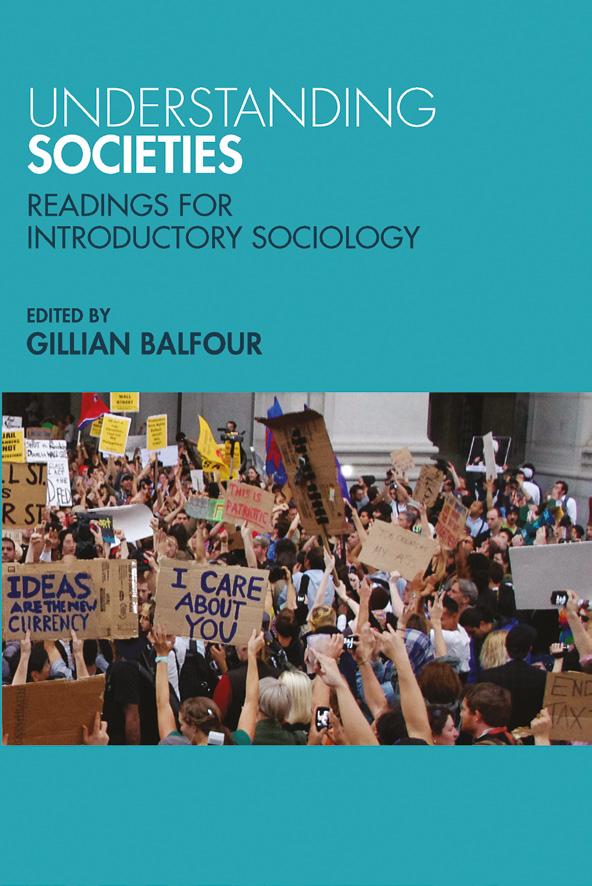
edited by Gillian Balfour
This book is a collection of critical readings that animate contemporary sociological theory and research. Students will learn how sociology can be relevant in their everyday lives as they are introduced to scholars who challenge conventional thinking about how the world works.
Designed as a companion reader for introductory sociology students, each reading is set in context with clear linkages to Joanne Naiman’s How Societies Work. Students will read about racial profiling, wrongful convictions, homophobia, human trafficking, professional sports, sweatshop labour and residential schools. Each chapter illustrates how sociologists think about social inequality, power and social transformation.

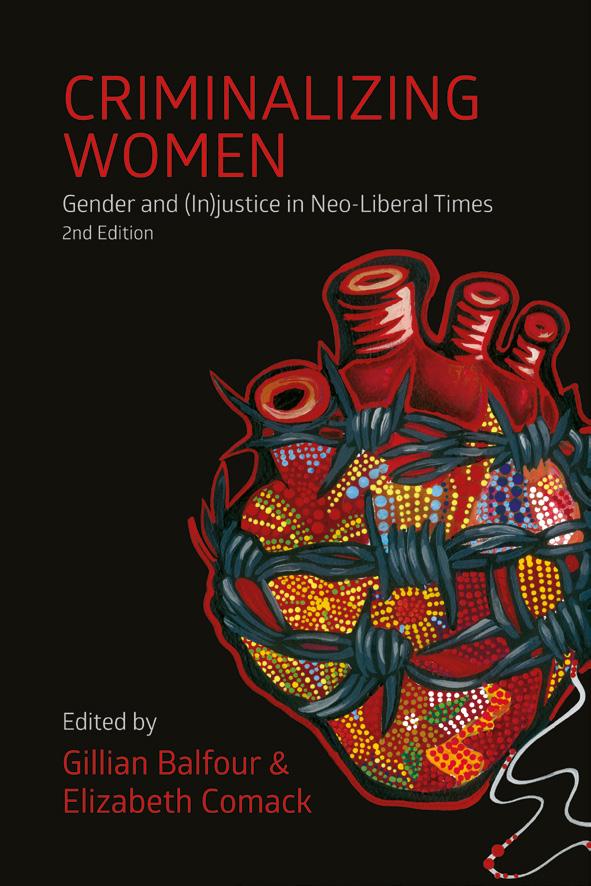
Paperback • 9781552666821
$44.95 • September 2014
Digital Formats • $44.99
6 x 9" • 384 pp • Rights: World
Gender and (In) justice in Neo-Liberal Times
edited by Gillian Balfour and Elizabeth Comack
Criminalizing women has become all too frequent in these neo-liberal times. Meanwhile, poverty, racism and misogyny continue to frame criminalized women’s lives. This second edition of Criminalizing Women introduces readers to the key issues addressed by feminists engaged in criminology research over the past four decades. Chapters explore how narratives that construct women as errant females, prostitutes, street gang associates and symbols of moral corruption mask the connections between women’s restricted choices and the conditions of their lives. The book shows how women have been surveilled, disciplined, managed, corrected and punished, and it considers the feminist strategies that have been used to address the impact of imprisonment and to draw attention to the systemic abuses against poor and racialized women.
In addition to updating material in the introductions and substantive chapters, this second edition includes new contributions that consider the media representations of missing and murdered women in Vancouver’s Downtown Eastside, the gendered impact of video surveillance technologies (cctv), the role of therapeutic interventions in the death of Ashley Smith, the progressive potential of the Inside/Out Prison Exchange Program and the use of music and video as decolonizing strategies.

Paperback • 9781773630953
$65.00 • April 2020
Digital Formats • $64.99
6 x 9" • 592 pp •Rights: World
by Tony Simmons
How do we make sense of the rise of political strongmen like Trump and Erdoğan, or the increase in hate crimes and terrorism? How can we understand Brexit and xenophobic, anti-immigrant sentiments and policies? More importantly, what can we do to make it all stop?
Social theory deepens our understanding of the world around us by empowering us to become practical theorists in our own lives. In Restless Ideas, Simmons traces the roots of contemporary social theory back to the works of the early structural functionalists, systems theorists, conflict theorists, symbolic interactionists and ethnomethodologists, and incorporates contemporary social thinkers theorizing from the margins who are redefining the canon.
Later chapters focus on the current influence of structuration theory, feminist and queer theory, Indigenous theory, third wave critical theory, postmodernism and poststructuralism, liquid and late modernity theories and globalization theories.


Paperback • 9781552666579
$45.00 • February 2014
Digital Formats • $44.99
6 x 9" • 354 pp • Rights: World
edited by Elizabeth Comack
Students regularly tell me that Locating Law is their favourite book out of the selections available. The case studies are sufficiently different from one another that the students deepen their general knowledge, and they appreciate the fact that the chapters are written in a style they can understand.
—jennifer jarman, Lakehead University
A primary concern within the study of law has been to understand the “law-society” relation. Underlying this concern is the belief that law has a distinctly social basis; it both shapes — and is shaped by — the society in which it operates. This book explores the law-society relation by locating law within the nexus of race/class/gender/sexuality relations in society.
In addition to updating the material in the theoretical and substantive chapters, this third edition of Locating Law includes three new contributions: sentencing law and Aboriginal peoples; corporations and the law; and obscenity and indecency legislation. The analyses offered in the book are sure to generate discussion and debate and, in the process, enhance our understanding of law’s location.
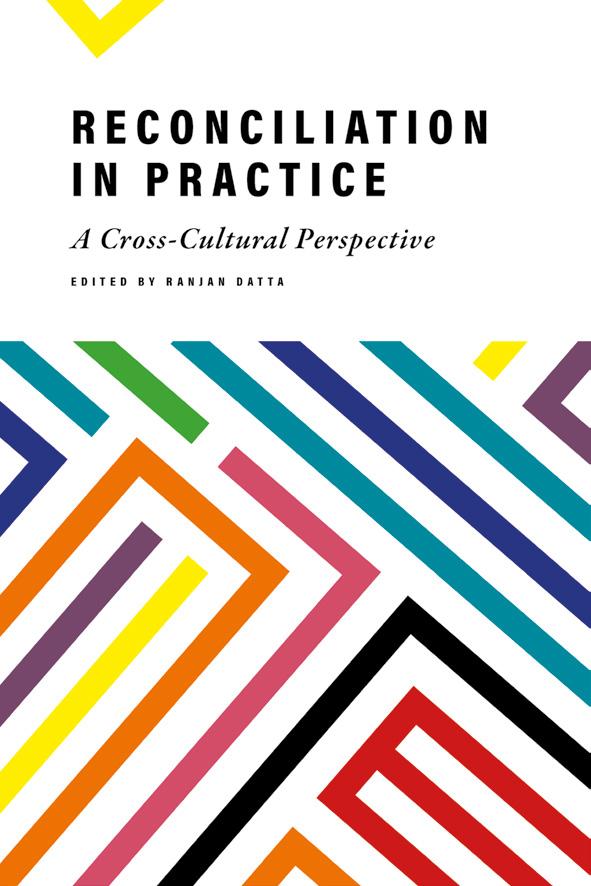
Paperback • 9781773631707
$25.00 • October 2019
Digital Formats • $24.99
6 x 9" • 188 pages • Rights: World
edited by Ranjan Datta
In 2015, the Truth and Reconciliation Commission released a report designed to facilitate reconciliation between the Canadian state and Indigenous Peoples. Its call to honour treaty relationships reminds us that we are all treaty people — including immigrants and refugees living in Canada. The contributors to this volume, many of whom are themselves immigrants and refugees, take up the challenge of imagining what it means for immigrants and refugees to live as treaty people. Through essays, personal reflections and poetry, the authors explore what reconciliation is and what it means to live in relationship with Indigenous Peoples.
Speaking from their personal experiences — whether from the education and health care systems, through research and a community garden, or from experiences of discrimination and marginalization — contributors share their stories of what reconciliation means in practice. They write about building respectful relationships with Indigenous Peoples, respecting Indigenous Treaties, decolonizing our ways of knowing and acting, learning the role of colonized education processes, protecting our land and environment, creating food security and creating an intercultural space for social interactions.
Perhaps most importantly, Reconciliation in Practice reminds us that reconciliation is an ongoing process, and that decolonizing our relationships and building new ones based on understanding and respect is empowering for all of us — Indigenous, settler, immigrant and refugee alike.


Paperback • 9781773631417
$35.00 • September 2019
Formats • $34.99 6 x 9" • 252 pp • Rights: World
by Andrew Woolford and Amanda Nelund
In this updated edition of The Politics of Restorative Justice, Andrew Woolford and Amanda Nelund reconsider restorative justice and its politics and ask how restorative justice might work better to provide transformative justice. To achieve a transformative justice, Woolford and Neulund argue, restorative justice must be concerned with class-based, gendered, racialized and other injustices.
In this second edition, the authors expand on how intersecting socio-political contexts — gendered, racialized, settler colonial, hetero-normative and others — contour the practice and potential of restorative justice. In addition to updated examples and data, this edition discusses the embodied and emotional politics of restorative justice, transformative restorative justice and other-than-human actors/ecological justice.
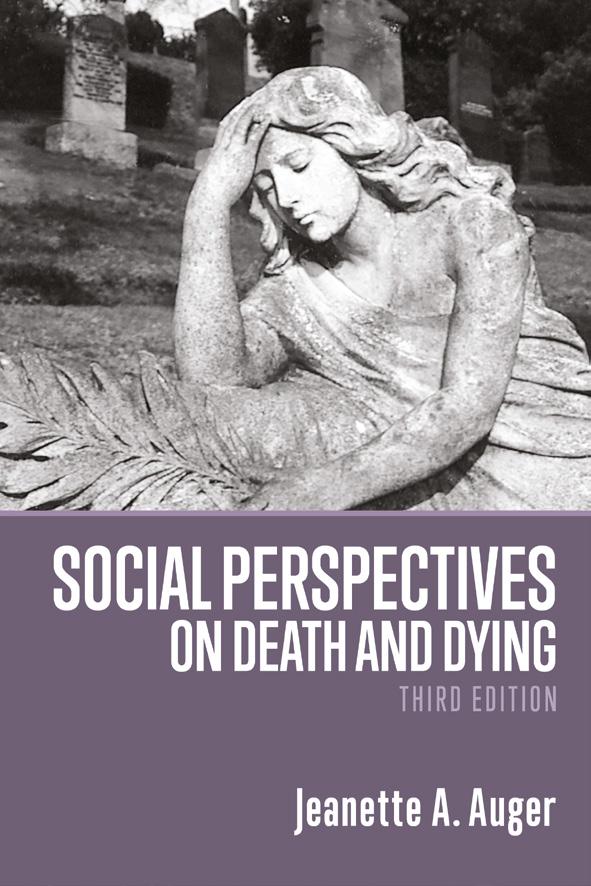
by Jeanette A. Auger
Death is inevitable, but our perspectives about death and dying are socially constructed. This updated third edition takes us through the maze of issues, both social and personal, which surround death and dying in Canada. Topics include euthanasia and medically assisted death, palliative care and hospices, the high incidence of opioid deaths, the impact of cyber bullying in suicide deaths, the sociology of hiv/aids, funeral and burial practices, the high rates of suicide in Canada and dealing with grief and bereavement, among others. Additionally, Auger explores alternative methods for helping dying persons and their loved ones deal with death in a holistic, patient-centred way. Each chapter includes suggested readings, discussion questions and in-class assignments.

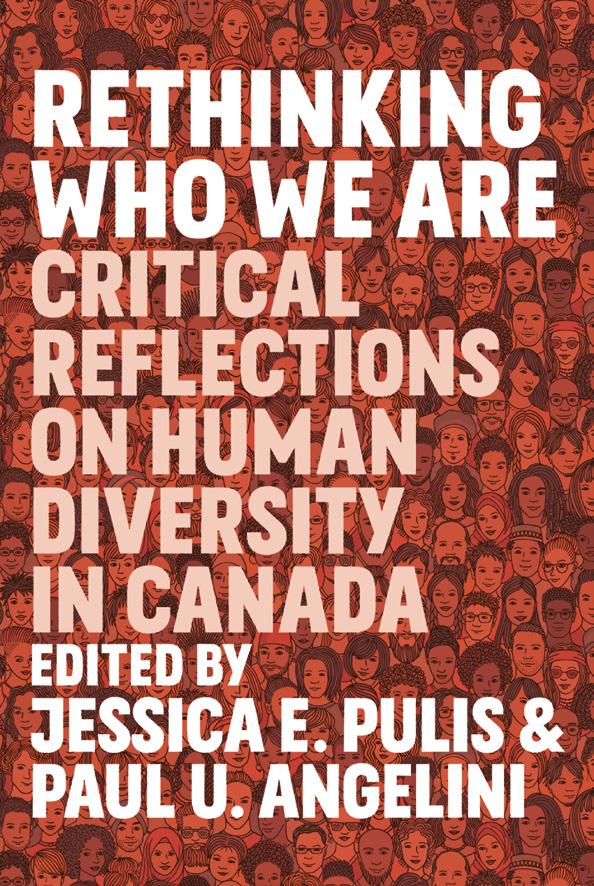
Paperback • 9781773631356
$50.00 • May 2019
Digital Formats • $49.99 6 x 9" • 384 pp • Rights: World
edited by Jessica E. Pulis and Paul U. Angelini
Rethinking Who We Are takes a non-conventional approach to understanding human difference in Canada. Contributors to this volume critically re-examine Canadian identity by rethinking who we are and what we are becoming by scrutinizing the “totality” of difference. Included are analyses on the macro differences among Canadians, such as the disparities produced from unequal treatment under Canadian law, human rights legislation and health care. Contributors also explore the diversities that are often treated in a non-traditional manner on the bases of gender, class, sexuality, disAbility and Indigeniety. Finally, the ways in which difference is treated in Canada’s legal system, literature and the media are explored with an aim to challenge existing orthodoxy and push readers to critically examine their beliefs and ideas, particularly in an age where divisive, racist and xenophobic politics and attitudes are resurfacing.
Teaching Learning Guide available upon request
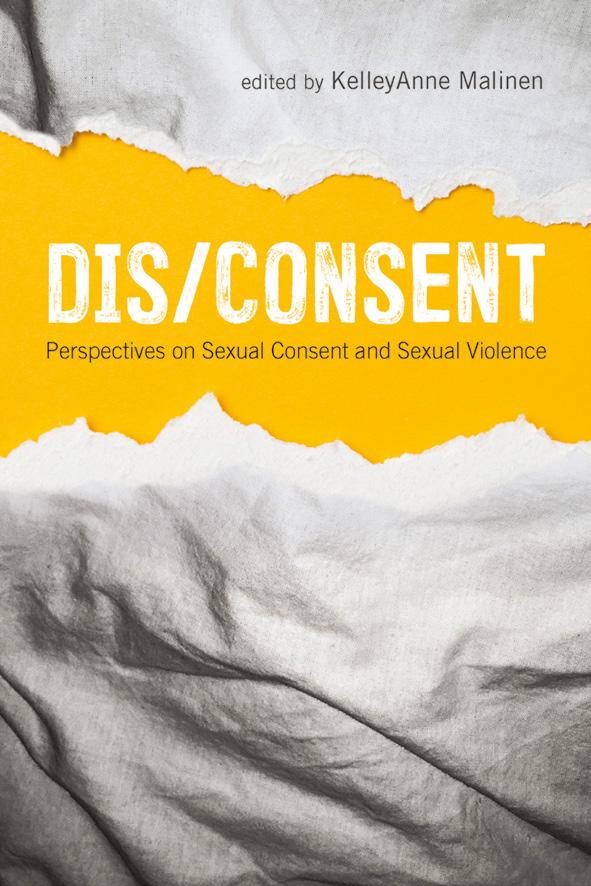
edited by KelleyAnne Malinen
Sexual violence is prevalent in our society. We know this directly because of the courage survivors have shown in facing their perpetrators in courts, online and in the public eye. But society is hesitant, incapable or unwilling to hold offenders to account: they keep their jobs — or get promoted to powerful positions — and survivors frequently end up being on trial themselves. Furthermore, mainstream discourse and thinking about sexual violence and consent are limited to problematic op-eds, oversimplified viral videos or tweets. These will not end sexual violence.
The contributors to Dis/Consent argue that the conversations happening today around consent and sexual violence ignore and erase the multiple forms of oppression that are part and parcel of sexual violence. They highlight the relationships between our social structures, social institutions and individual experiences of sexual consent and sexual violence. And because sexism, racism, misogyny, homophobia, transphobia and ableism are deeply intertwined with sexual violence, it will not be undone without systemic, anti-oppressive, decolonizing change. Refusing to reduce intersectionality to a hasty footnote, this volume examines the construction of sexual violence and consent at diverse intersections of identity and includes a diversity of perspectives and positionalities rarely found in conversations about sexual violence and sexual consent.

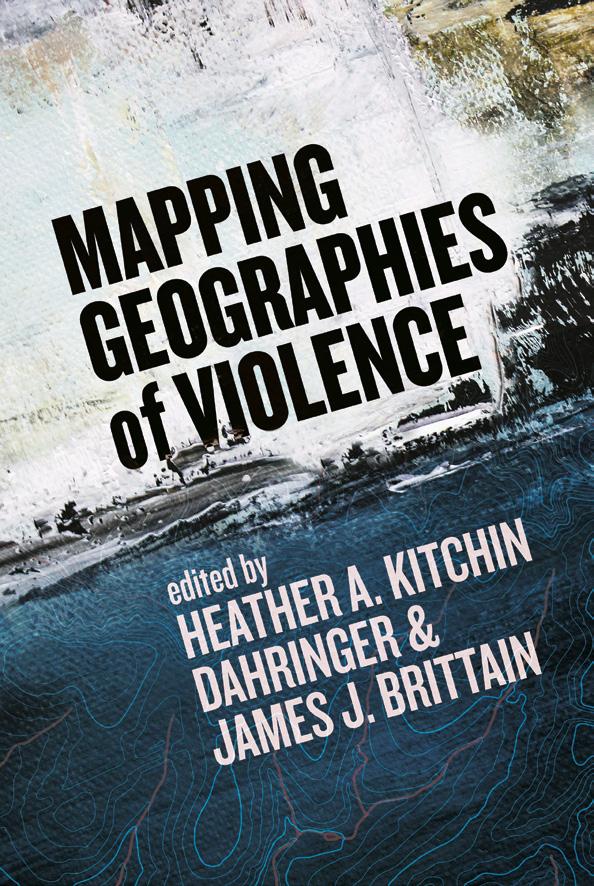
Paperback • 9781552669747
edited by Heather A. Kitchin Dahringer and James J. Brittain
The contributors to Mapping Geographies of Violence explore the multi-layered meaning of violence and the various ways it occupies our daily lives, be they overt, institutional, structural or covert. With an eye towards social justice, each chapter offers a discrete definition of violence and provides readers with a range of theoretical orientations, from social psychology, symbolic interactionism and Marxism to discourse analysis. From these perspectives, several examples of violence are explored: anti-feminism, police raids, gendered violence, mental illness, sex work and poverty.
Mapping Geographies of Violence presents readers with a larger understanding and analysis of how violence, far from just an expression of individuals or groups, is rooted in social constructs like class, patriarchy and racism.

by Clelia O. Rodríguez
Poetic, confrontational and radical, Decolonizing Academia speaks to those who have been taught to doubt themselves because of the politics of censorship, violence and silence that sustain the Ivory Tower. Clelia O. Rodríguez illustrates how academia is a racialized structure that erases the voices of people of colour, particularly women. She offers readers a gleam of hope through the voice of an inquisitorial thinker and methods of decolonial expression, including poetry, art and reflections that encompass much more than theory.
In Decolonizing Academia, Rodríguez passes the torch to her Latinx offspring to use as a tool to not only survive academic spaces but also dismantle systems of oppression. Through personal anecdotes, creative non-fiction and unflinching bravery, Rodríguez reveals how people of colour are ignored, erased and consumed in the name of research and tenured academic positions. Her work is a survival guide for people of colour entering academia. Paperback

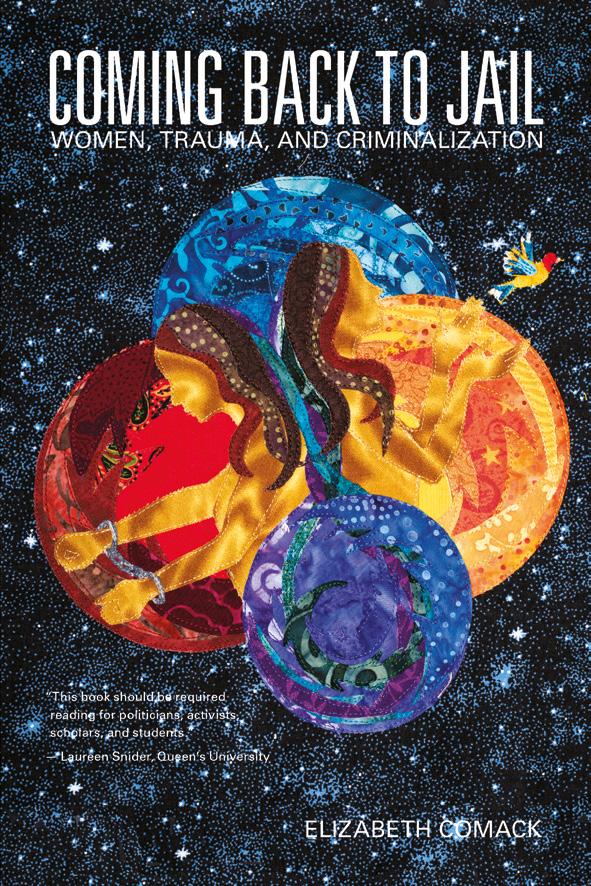
Paperback • 9781773630106
$29.00 • May 2018
Digital Formats • $28.99 6 x 9" • 272 pp • Rights: World
by Elizabeth Comack
This is a superb book. It breaks new ground in linking Aboriginality, gender and incarceration through in-depth interviews with forty-two female prisoners. This book should be required reading for politicians, activists, scholars and students.
—laureen snider, Queen’s University
Coming Back to Jail examines the role of trauma in the lives of forty-two incarcerated women. Resisting the popular move to understand trauma in psychiatric terms — as post-traumatic stress disorder (ptsd) — the book frames trauma as “lived experience” and locates the women’s lives within the context of a settler-colonial, capitalist, patriarchal society. Doing so enables a better appreciation of the social conditions that produce trauma and the problems, conflicts and dilemmas that bring women into the criminal justice net. In this book, Comack shows how — despite recent moves to be more “gender responsive” — the prisoning of women is ultimately more punishing than empowering. Because the sources of the women’s trauma reside in the systemic processes that have contoured their lives and their communities, true healing will require changing women’s social circumstances on the outside so they no longer keep coming back to jail.

by William K. Carroll and J.P.Sapinski
Canada is ruled by an organized minority of the 1%, a class of corporate owners, managers and bankers who amass wealth by controlling the large corporations at the core of the economy. But corporate power also reaches into civil society and politics in many ways that greatly constrain democracy. In Organizing the 1%, William K. Carroll and J.P. Sapinski provide a unique, evidence-based perspective on corporate power in Canada and illustrate the various ways it directs and shapes economic, political and cultural life.
In this highly accessible introduction to Marxist political economy, Carroll and Sapinski delve into the capitalist economic system at the root of corporate wealth and power and analyze the ways the capitalist class dominates over contemporary Canadian society. The authors illustrate how corporate power perpetuates inequality and injustice. They follow the development of corporate power through Canadian history, from its roots in settler-colonialism and the dispossession of Indigenous peoples from their land, to the concentration of capital into giant corporations in the late nineteenth century. More recently, capitalist globalization and the consolidation of a market-driven neoliberal regime have dramatically enhanced corporate power while exacerbating social and economic inequalities. The result is our current oligarchic order, where power is concentrated in a few corporations that are controlled by the super-wealthy and organized into a cohesive corporate elite. Finally, Carroll and Sapinski offer possibilities for placing corporate power where it actually belongs: in the dustbin of history.


Paperback • 9781773630120
$25.00 • May 2018
Digital Formats • $24.99 6 x 9" • 192 pp • Rights: World
edited by Andrew Crosby and Jeffrey Monaghan
An accessible must-read for all Canadians concerned about respectful relations with Indigenous People and the decline of civil rights in the war-on-terror era.
—publishers weekly
In recent years, Indigenous peoples have led a number of high profile movements fighting for social and environmental justice in Canada. From land struggles to struggles against resource extraction, pipeline development and fracking, land and water defenders have created a national discussion about these issues and successfully slowed the rate of resource extraction. But their success has also meant an increase in the surveillance and policing of Indigenous peoples and their movements. In Policing Indigenous Movements, Crosby and Monaghan use the Access to Information Act to interrogate how policing and other security agencies have been monitoring, cataloguing and working to silence Indigenous land defenders and other opponents of extractive capitalism. Through an examination of four prominent movements, this important book raises critical questions regarding the expansion of the security apparatus, the normalization of police surveillance targeting social movements, the relationship between police and energy corporations, the criminalization of dissent and threats to civil liberties and collective action in an era of extractive capitalism and hyper surveillance. In one of the most comprehensive accounts of contemporary government surveillance, the authors vividly demonstrate that it is the norms of settler colonialism that allow these movements to be classified as national security threats and the growing network of policing, governmental and private agencies that comprise what they call the security state.

by David Camfield
The best basis for political education in our times — one that is unlikely to be surpassed anytime soon.
—international viewpoint
Camfield’s innovative case powerfully demonstrates that historical materialism — if creatively applied — offers a compelling means to critically understand and change our world.
—david
mcnally, York University
The view that capitalism is an inherently flawed, exploitative, crisis-prone, oppressive system is not new. But neoliberal capitalism’s flaws are increasingly dangerous in Western countries and globally as corporations exert growing influence on governments, as the endless pursuit of profits pushes our climate to the breaking point and as far-right politics dominate the media. Solutions are needed. Fast. In We Can Do Better, David Camfield lays out a theoretical basis for political and social change that fuses critical Marxism with insights from anti-racist queer feminism. This reconstructed historical materialism treats capitalism and class as inextricably interwoven with gender, race and sexuality. After discussing today’s most influential social theories, Camfield uses this theory to analyze a range of issues that face our world today, including climate change, growing social insecurity and the persistence of sexism and racism. Camfield argues that the key to achieving change for the better is social struggle, and he offers ideas about moving from social theory to social action.


$18.00
by Lillian Zimmerman; foreword by Bonnie Sherr Klein
With incredible wit, wisdom and thoughtfulness, author Lillian Zimmerman exposes and challenges pervasive ageist assumptions and stereotypes that continue to permeate society.
—barbara a. mitchell, Simon Fraser University
Did You Just Call Me Old Lady? is an upbeat look at aging and the impacts of Canada’s increasingly aged population through the eyes of a ninety-year-old woman. Far from seeing older citizens as a burden and a strain on our public health care system, Lillian Zimmerman gracefully, and often humourously, argues that long-livers are able to live fulfilling lives and make valuable contributions to society.
Zimmerman illustrates how prevalent ageism — the dislike and prejudice against old people — is in society, media and popular culture, showing how language, advertisements for products to alleviate bodily failings, and jokes about memory loss and sexual infirmity are all examples of ageism, inevitably framing and fuelling negative attitudes towards older people. Ageism, much like sexism and racism, needs to be part of the conversations around social justice and anti-oppression. Zimmerman also recognizes that there are huge challenges to aging, some of which she has experienced herself, and that serious illnesses, mental deficiencies, low income and isolation are realities for some seniors. However, Zimmerman’s analysis shows that many of these problems result from inefficient management and poor policies.

by Eva Mackey
Lucid and accessible, Unsettled Expectations will appeal to general readers, students and professors, activists and ngo workers, government policy-makers, members of the legal profession, and media. —daniel coleman, McMaster University
What do local conflicts about land rights tell us about Indigenous-settler relations and the challenges and possibilities of decolonization? In Unsettled Expectations, Eva Mackey draws on ethnographic case studies about land rights conflicts in Canada and the US to argue that critical analysis of present-day disputes over land, belonging and sovereignty will help us understand how colonization is reproduced today and how to challenge it.
Employing theoretical approaches from Indigenous and settler colonial studies, and in the context of critical historical and legal analysis, Mackey urges us to rethink the assumptions of settler certainty that underpin current conflicts between settlers and Indigenous peoples and reveals settler privilege to be a doomed fantasy of entitlement. Finally, Mackey draws on case studies of Indigenous-settler alliances to show how embracing difficult uncertainty can be an integral part of undoing settler privilege and a step toward decolonization.


Paperback • 9781552668252
$18.00 • April 2016 Digital Format • $17.99 5 x 7" • 190 pp • World
by Pat Armstrong and Hugh Armstrong
Health care is Canada’s best-loved social program — and for good reason. For over forty years, Canadians have enjoyed high quality health services based on need rather than on ability to pay. Yet we hear almost daily accounts of problems with the system. We are bombarded with warnings that public health care is unsustainable, especially in light of the baby boomer generation reaching retirement age. Such stories can help undermine our support for public care even though they are often based on poor, partial or even false information. Our best defence of a public system is knowledge about how it works and how it can be improved in order to keep it.
This second edition of About Canada: Health Care is an accessible, up-to-date introduction to how the Canadian health care system works, how it is changing and what can be done to make it better. Pat and Hugh Armstrong explain a range of complicated and important questions: What do “public” and “private” mean as they apply to our current health care system and in proposed reforms? As the boomer generation ages, will the growing number of seniors bankrupt Medicare? What do we mean by wait times and are they increasing? Who pays for drugs and how can we ensure Canadians have equitable access to necessary drugs? Can technologies significantly improve care and reduce costs?
The about canada series is an accessibly written and affordable collection of books that explore cultural and political issues that are central to our Canadian identity.

by Laureen Snider
When corporations misbehave the consequences are devastating. The monetary costs of the 2008 financial crisis, a direct result of financial mismanagement, were in the trillions, and yet none of those responsible were held to account. The monetary costs of Criminal Code theft pale in comparison, and yet our prisons are filled with people who commit “street theft.” In order to understand why governments, regulators, unions, activists and community groups have such a difficult time preventing and sanctioning corporate criminals we must first recognize the vital role of corporate economic power. Assessing the present state and future prospects of corporate crime, this book asks: How did we get here? What do we know about corporate crime? Why does it matter? And what are the main issues/developments today? In the end, it asks the most important question of all: How can political and economic systems be changed to prevent, or at the very least mitigate, the tremendous damage corporate activities are inflicting on human lives, health, jobs, communities and economies?
The about canada series is an accessibly written and affordable collection of books that explore cultural and political issues that are central to our Canadian identity.

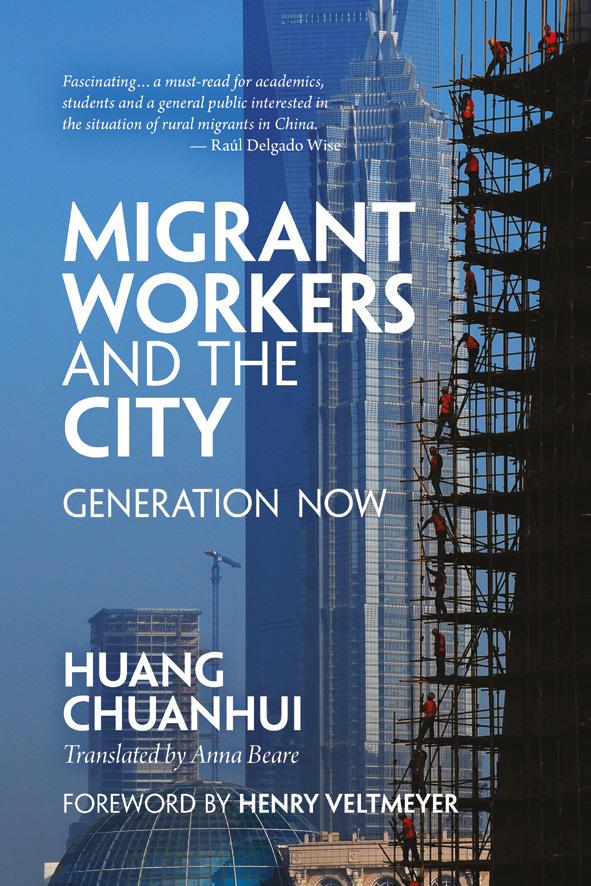
Paperback • 9781552668955
$26.00 • September 2016
by Huang Chuanhui; foreword by Henry Veltmeyer; translated by Anna Beare
Fascinating…a must-read for academics, students and a general public interested in the situation of rural migrants in China.
—Raúl Delgado Wise
Today China has the second largest economy in the world. The largest human migration in history has fueled this rapid growth as people move from the countryside to work in China’s fast growing industrial cities. But China is changing. Today’s migrants from the countryside are a world apart from their fathers and grandfathers who made the same journeys to the metropolis in search of work decades before them. The older generation made the journey with every expectation of returning to the countryside once they had made some money. Today's generation, better educated and connected by technology, expects higher wages from working in cities than is the reality. These workers do not want to return home to work on the farm, so they frequently take employment that is precarious and poorly paid. In this refreshingly open and enlightening book we hear the stories and hopes for the future from the people who live in the basements of cities across China.

edited by Jeanette Robertson and Grant Larson
This edited collection uses a critical theory perspective and draws on expertise from a range of contemporary policy and practice areas. Contributors include people with disabilities, family members, researchers, academics and practitioners.
This book is an ideal text for students of social work, human services, child and youth care and disability studies. Chapters include first-person accounts from persons with disabilities, perspectives of families and historical perspectives, as well as a critical exploration of demographics, human rights issues, disability legislation and policy in Canada, theoretical approaches to disability, intersectionality and disability, Aboriginal people and disability, mental health disability, principles of anti-ableist practice, advocacy and strategies for change. This book offers as a fresh Canadian perspective on disability from a critical lens, challenging and inspiring students and practitioners alike to think outside the box and to examine their own attitudes and values toward disability, ensuring that they do not inadvertently impose ableist and oppressive practices on one of Canada’s most marginalized populations.


Paperback • 9781552668245
$28.00 • September 2016
6 x 9" • 218 pp • World
by Murray Knuttila
Men commit crimes. Men are violent. Men start wars. Men have power. In Paying for Masculinity, Murray Knuttila argues that male dominance is best understood in the context of the particular mode of gender practice — hegemonic masculinity — that typifies patriarchal gender orders. This mode of masculinity permeates our society, media and culture. It persists because of “the patriarchal dividend” — men directly benefit from their dominance in society. But these benefits exact a price, first and foremost from women and girls. But, as boys and men are under pressure to “man up,” they too pay the costs: they die younger, go to prison, restrict their emotions and blunt their humanity. Simply put, men need to understand that the costs of practising this mode of masculinity far outweigh the benefits. Knuttila’s conceptual framework allows him to trace the history of the patriarchal dividend through various aspects of patriarchal capitalism, demonstrating how ingrained it is in our society, and to illustrate ways of encouraging non-hegemonic forms of masculinity, which are ultimately to the benefit of everyone.

Paperback • 9781552668290
$25.00 • April 2016
• $24.99 6 x 9" • 278 pp • World
by John Sorenson
Sorenson brilliantly exposes the primary discursive and legal strategies employed to manage social dissent, as well as the outright lies, deceptions, hypocrisies, and dirty tactics employed to protect the corporate and political interests of the animal and environmental exploitation industries.
—richard jackson, University of Otago, New Zealand
Animal rights is an important social justice movement, and the animal rights movement presents ethical and political challenges to deeply rooted structures of violence and exploitation, challenging ideologies of capitalism and speciesism. Corporate interests that form the animal industrial complex understand the animal rights movement as a threat to their profits and have mobilized to undermine it. Informed by both critical animal studies and critical terrorism studies, John Sorenson analyzes ecoterrorism as a social construction. He examines how corporations that profit from animal exploitation fund and produce propaganda to portray the compassionate goals and nonviolent practices of animal activists as outlandish, anti-human campaigns that operate by violent means not only to destroy Western civilization but also to create actual genocide. The idea of concern for others is itself a dangerous one, and capitalism works by keeping people focused on individual interests and discouraging compassion and commitment to others. Driven by powerful and wealthy industries founded upon the exploitation of nonhuman animals and the extraction of natural resources, the discourse of ecoterrorism is a useful mechanism to repress criticism of the institutionalized violence and cruelty of these industries as well as their destructive impact on the environment, their major contribution to global warming and ecological disaster, and their negative impacts on human health.


Paperback • 9781552668504
$28.00 • April 2016
Digital Formats • $27.99
6 x 9" • 166 pp • Rights: World
by Susan Boyd, Connie I. Carter and Donald MacPherson
This book expanded students' thinking and understanding and fostered critical and reflective thought. Readings sparked rich conversations about their own hopes and wishes for the field, broader social and political responses and the impact on youth and families affected by substances.
—stephanie mccune, University of Victoria
In More Harm Than Good, Carter, Boyd and MacPherson take a critical look at the current state of Canadian drug policy and raise key questions about the effects of Canada’s increasing involvement in and commitment to the “war on drugs.” A primer on Canadian drug policy, the analysis in More Harm Than Good is shaped by critical sociology and feminist perspectives on drugs and incorporates insights not only from individuals who are on the front lines of drug policy in Canada — treatment and service workers — but also from those who live with the consequences of that policy on a daily basis — people who use criminalized drugs. Finally, the authors propose realistic alternatives to today’s failed policy approach.

Paperback • 9781552667347
edited by Carolyn Brooks and Bernard Schissel
This well-received criminology textbook, now in its third edition, argues that crime must be understood as both a social and a political phenomenon. Using this lens, Marginality and Condemnation contends that what is defined as criminal, how we respond to “crime” and why individuals behave in anti-social ways are often the result of individual and systemic social inequalities and disparities in power.
Beginning with an overview of criminological discourse, mainstream approaches and new directions in criminological theory, the book is then divided into sections based on key social inequalities of class, gender, race and age, each of which begins with an outline of the general issues for understanding crime and an introduction that guides readers through the empirical chapters that follow. The studies provide insights into general issues in criminology, ranging from the historical and current nature of crime and criminal justice to the various responses to criminality. Readers are encouraged and challenged to understand crime and justice through concrete analyses rather than abstract argumentation.
Teaching Learning Guide available upon request
2970 Oxford Street Halifax, NS, B2L 2W4 phone (902) 857-1388 info@fernpub.ca
Fernwood works as a guest on unceded Indigenous lands; specifically, we create from Kjipuktuk in Mi’kma’ki, colonially known as Halifax, Nova Scotia, the territory of the Mi’kmaq, as well as in Winnipeg, Manitoba, the original lands of Anishinaabeg, Cree, Oji-Cree, Dakota and Dene peoples, and the homeland of the Métis Nation, which in 1871 became Treaty 1 territory.
As settlers working in publishing, we have a responsibility to understand and challenge the Canadian state’s history of racist and colonial writing and publishing practices, including the erasure of Indigenous knowledges, the ongoing systemic undermining of oral history and knowledge, and land theft. We dedicate ourselves to respectful collaboration with Indigenous communities in producing critical books.
Fernwood Publishing Company Limited gratefully acknowledges the financial support of the Government of Canada, the Province of Manitoba, the Province of Nova Scotia and the Canada Council for the Arts.
You can access the entire list of titles in print from Fernwood and Roseway via our website at fernwoodpublishing.ca. Please note that prices in this catalogue are subject to change without notice.
University of Toronto Press Distribution
5201 Dufferin Street, Toronto, ON, M3H 5T8
tel: (416) 667-7791
toll-free: +1 (800) 565-9523
e: utpbooks@utpress.utoronto.ca
For any queries relating to ordering, accessing or availability of our books, please visit fernwoodpublishing.ca/ordering, or send us an email to orders@fernpub.ca
Institutional Bookstores can place orders directly with UTP distribution. Please email utpbooks@utpress.utoronto.ca.
Ampersand Inc.
ampersandinc.ca
toll-free: (866) 849-3819
toronto office
tel: (416) 703-0666
321 Carlaw Ave, Suite 213 Toronto, ON, M4M 2S1 Canada
Vancouver office
tel: (604) 243-5594
2440 Viking Way Richmond, BC, V6V 1N2 Canada
ebooks can be purchased from
▶ Fernwood Publishing website
▶ Campus eBookstore and Vital Source
▶ Indigo Books, Amazon, Kobo, OverDrive, Google Play and more
▶ Licensed ebooks available on Les Libraires
interested in select chapters?
Write to us at permissions@fernpub.ca
Central Books Ltd
50 Freshwater Road, Chadwell Heath, London, England, RM8 1RX
tel: +44 (0) 20-8525-8800
e: orders@centralbooks.com
Columbia University Press / Ingram Publisher Services
For more information about exam copies and institutional orders, please contact your Columbia University Press sales representative, or visit cup.columbia.edu/for-instructors.
southeast: catherine hobbs tel: (804) 690-8529
e: ch2714@columbia.edu
northeast: conor broughan tel: (917) 826-7676
e: cb2476@columbia.edu
midwest: kevin kurtz tel: (773) 316-1116
e: kk2841@columbia.edu
west: william gawronski tel: (310) 488-9059
e: wgawronski@earthlink.net
brad hebel
tel: (212) 459-0600, Ext. 7130
e: bh2106z@columbia.edu
We will provide examination copies of our books for consideration as course texts. Please include the course name, expected enrollment and expected date of adoption in your exam copy request. We will email your exam copy unless you specify that you need a paper copy. We reserve the right to limit print versions of examination copies and/ or to provide them on a pre-payment basis. For an examination copy, please contact us at examrequest@fernpub.ca.

contact our office
2970 Oxford St, Halifax, NS, B2L 2W4 tel: (902) 857-1388 info@fernpub.ca